
CREDITS
GAME DESIGN & ART DIRECTION
Steven Medway
PRODUCTION & PROMOTION
Evin Donohoe
SOCIAL MEDIA, PHOTOGRAPHY, BEHIND THE SCENES
Andy Churchill
TECHNICAL SHENANIGANS
Amy Hawkes
CONVENTIONS & ADMINISTRATION
Eden Medway
COMMUNITY & PR MANAGEMENT
Ben Burns
STORYTELLER BARON
Ted Helm
ART

John VanFleet, Micaela Dawn, Grace VanFleet, Aidan Roberts
GRAPHIC DESIGN
Chloe McDougall, John Hanna
ADDITIONAL ART & VISUAL DESIGN
Anica Kelsen, Matt Hughes, Zoe Benetatos, John Grist, Chris Allen, Caitlin Murphy, Marianna Carr
RULEBOOK EDITING
Joshua Yearsley
RULES INQUISITOR
Jon Gjengset
ADDITIONAL IDEAS & INSPIRATION
Evin Donohoe (Blacksmith, Lycanthrope, Cannibal, Pixie, Engineer, Copycat, Hustler, Insomniac, Psychopath, Queen of Lies), Angelus Morningstar (Tycoon, Casanova, Golden Child, Queen, Riddle Fiend, Plague Doctor, Houndskeeper), Amy Hawkes (Apothecary, Quack, Tipi-Tipi, Pixie, Lil’ Monsta), Lachlan McCubbin (Cannibal, Shacklewight, Highwayman, Yaggababble, Lim ei Legba), Marianna Carr (Snake Charmer, Gladiator, Queen of Lies), Julian Orbach (Prophet, Fiddler), Ben Clowes (Sicilian, The Rising), Doug Williams (Huntsman, Damsel), Filip Lovely (Prisoner, Zombuul), Regina Neeson (Familiar), Lewis Worthington (Vat Dweller), Alex Thompson (Pacifist), Jesse Gabriel (Haunt), Malcolm Ryan (Lleech), Simon Mackenzie (Summoner), Elsbeth Green (Daughter of Nox), John Conal Donohoe (Psychopath)

CONTENTS THE BASICS 4 What Is This Game? 4 What Is In The Box? 6 What Is The Town Square? 7 What Is The Grimoire? 8 RUNNING THE GAME 10 Setup 10 The Night 12 The Day 14 Ending The Game 16 THE NITTY-GRITTY 19 Abilities 20 States 21 Traveller Characters 24 Fabled Characters 25 GREAT STORYTELLING 27 Running Things Smoothly 28 Making Things Fun 30 GOING FURTHER 35 The Script Tool 36 Teensyville 36 Growing Your Group 37 The Editions 40 GLOSSARY 42

If you’ve already played BLOOD ON THE CLOCKTOWER and have a rough idea of how the Grimoire works, you can skip ahead to RUNNING THE GAME (page 10). If not… To prepare for your first game:

1. Read THE BASICS (page 4). This chapter will give you an overview of BLOOD ON THE CLOCKTOWER so you can understand what kind of game it is. If you are already familiar with social deduction games such as WEREWOLF or MAFIA, you will find some familiar territory here.
2. Read RUNNING THE GAME (page 10). This chapter explains the basic rules of the game. You will learn how to start a game, how to end it, and what to do in between.
3. Read the TROUBLE BREWING character almanac. TROUBLE BREWING is the most basic edition of CLOCKTOWER, and we highly recommend you start with it. Take a look at the characters and get a sense of each one. You don’t need to know every detail of every character combination—just enough to get a rough idea of how they work.
Once you’ve done this, you are ready to run your first game! While running a game, if you need to quickly clarify a rule, read the GLOSSARY (page 42). The GLOSSARY is much more than just definitions of terms—all the important game rules are listed there alphabetically. If anyone wants more information about how a character works, refer to their entry in the appropriate character almanac, which explains each character’s weird and wonderful nuances, as well as interactions with other characters in that almanac.
After running your first game or two, you’ll find it handy to read further:
THE NITTY-GRITTY (page 19) includes guidelines for interpreting the rules and the characters’ abilities as well as a cornucopia of information on the types of characters available.
GREAT STORYTELLING (page 27) gives tips and tools to help you take your games to the next level.
GOING FURTHER (page 35) describes how to create custom lists of characters, gives advice on growing your CLOCKTOWER group, and catalogues many new editions—collections of characters you can add to your game. This chapter will help you make your games smoother, massively more fun, infinitely varied, subtly weird, and fiendishly challenging!
You can read the BAD MOON RISING and SECTS & VIOLETS almanacs once you wish to run them. Don’t worry about these editions until then. Your understanding is more important than blindly following a procedure. Instead of simply listing the game rules in one dry chunk and hoping that you absorb it all at once, this rulebook is written in such a way that you learn the rules while you learn what you need to do as the Storyteller. You can expand your knowledge and add flair to your games once you’ve got the basics down.
The players you will guide don’t need to read any of this rulebook, nor any of the almanacs or sheets included. Part of your role as Storyteller is to familiarize them with the basic rules at the start of their first game. That said, players are still welcome to read whatever tickles their fancy in these rulebooks—there is nothing secret here.
YOU ARE THE STORYTELLER. You are the boss. You will be the person who reads the rules, who referees the game, and who creates the chaotic and fun situations in which your players will play. Many people find the Storyteller role the most creative, rewarding, and interesting of all. This book is written for you, and you will need to read some of it before running your first game.
WHAT IS THIS GAME?


ALONG TIME AGO in the sleepy town of Ravenswood Bluff, during a hellish thunderstorm, on the stroke of midnight a scream echoes down the vine-covered stones of its twisting alleyways.
The startled townsfolk rush to the town square to investigate, and find that the local storyteller has been murdered, their body impaled on the hour hand of the town clock, blood dripping onto the cobblestones below. Curiosity turns to fear, as it soon becomes obvious to all that a demon is on the loose, killing by night and taking on human form by day.
Each of the townsfolk has some information, but the demon and its evil minions are spreading lies to confuse and breed suspicion over the identity of the fiend. Will the good folk put the pieces of the puzzle together in time? Or will evil overrun this once peaceful town?
BLOOD ON THE CLOCKTOWER is a social game of deduction and deception, lies and logic, murder and mystery, for five to twenty players. During the day, players talk and socialize as a group, or go into private conversations to gather information, share what they know, or spread lies. During the night, players close their eyes, while some good players wake to learn valuable information, and the demon and its minions wake to spread their mischief.
Each player is a unique character, with a powerful ability to use or a troublesome penalty to avoid. CLOCKTOWER is mostly a talking game, with almost no physical pieces for the players to use. Players win or lose by their wits, their insight, and their ability to convince others about who should live and who should die.
BLOOD ON THE CLOCKTOWER games usually run for thirty to ninety minutes, and you may find yourselves playing several games one after the other.
EXAMPLE OF PLAY
ELEVEN PLAYERS ARE SITTING in a dimly lit room, on couches and comfy chairs, facing each other in a rough circle. Spooky music plays softly in the background. Most players are arguing, and some are listening. They each have a secret identity, and they all know that three of them are evil, while eight of them are good. The good players do not know each other, and are trying to figure out who is good and who is evil. The evil players know each other, and are spreading lies about who is who. The mood is tense.
Marianna, Julian, and Alex, all sitting on the same couch and talking amongst themselves, finally join in. “I am the Investigator,” says Marianna, “which means I know that either Abdallah or Sarah is an evil Minion—the Scarlet Woman, to be exact.”
“Well, you can’t kill me,” says Abdallah, “because I am the Saint. If I am executed, we all lose. It’s got to be Sarah.”
“That’s bullshit!” says Sarah, “I am the Fortune Teller! I am good! You need to keep me alive so that I can gain information. Abdallah is evil! Don’t trust him.”
“Well, well, well,” says Alex, “that is very convenient, isn’t it? I am the Empath, which means I know that I am sitting next to one evil player and one good player. Either Julian is evil or you are evil, Sarah.”

“No,” says Sarah, “one of you is lying. Or maybe you are all lying! I am good! I swear!”
Lewis and Evin, on the other side of the room, stay quiet. Lewis is the Soldier and does not want to reveal his identity to the group just yet. Evin, the Monk, is watching and listening to determine who is valuable and who is expendable. Evin will be able to protect one player from death tonight, so he waits, letting other people do the talking.
Eventually, Doug speaks. “I am the Chef,” he says. “I know that two evil players are sitting next to each other. I think Marianna and Julian are evil. Or maybe Alex and Sarah are evil. Mind you, Sarah and Lachlan are sitting next to each other and have been whispering about god-knows-what. Maybe that’s the evil pair. Either way, I’d like to execute Sarah.”
After a few more minutes of chit-chat, the Storyteller enters the circle of players, holding the Grimoire—the game box with all the secret information—and asks for votes on which player will be executed today. The group decides to kill Sarah, despite her protests. Sarah, who was not the Demon, dies. Since the Demon is still alive, the game continues. The day ends, and night begins.
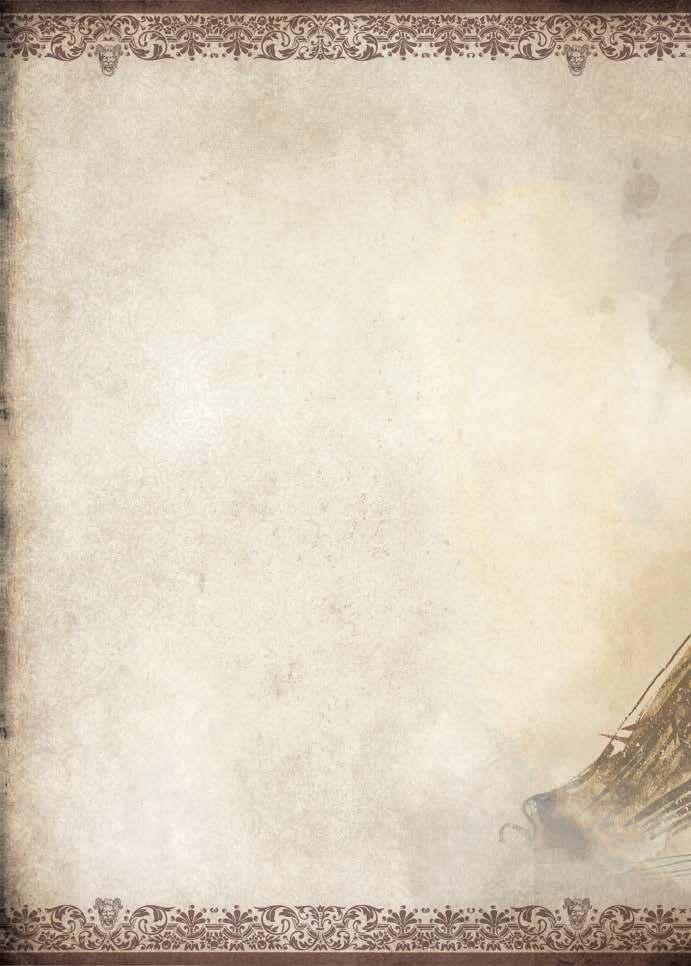
The Storyteller asks all players to close their eyes. The Storyteller walks around the circle and, one by one, taps on the shoulders of certain players. These players open their eyes to use their characters’ special abilities. Evin, the Monk, wakes up and points to Julian, signalling that Julian is protected from the Demon’s attack tonight. The Storyteller then signals to Evin to close his eyes again. Ben, the Demon, wakes up and points to Doug, the Chef, signalling that he wishes to attack Doug.
Lachlan, the evil Poisoner, wakes up and points to Julian, since he’d heard Julian whisper that he is the Undertaker— a character who learns which character died by execution. Julian is now poisoned and may get false information tonight. Sure enough, when Julian wakes later that night, the Storyteller signals to him that Sarah was the Drunk, a good character, even though Sarah was actually the Scarlet Woman.
After the night is finished, all players open their eyes, and the Storyteller tells the group that Doug died during the night.
“Damn,” says Doug.
BLOOD ON THE CLOCKTOWER 4
T H E B A S I C S
“Aha!” says Julian. “Sarah was not the Scarlet Woman at all! She was the Drunk! Sarah is good, which means either Abdallah or Marianna is lying!”
Lachlan, the evil Poisoner, feels satisfied that the poisoned Undertaker’s misinformation has helped the evil team recover from their initial loss of Sarah. Lachlan says, “Amy, why don’t you tell the group what you told me in private earlier?
You are a powerful character and could be very useful to us good folk.”
Amy speaks up. “I am the Slayer,” she says, interrupting a heated conversation between Sarah, Alex, Marianna, and Julian. “I am able to kill the Demon immediately if I can guess correctly who it is. But I only get one shot at it.”
Ben, the Demon, says, “Good idea! I reckon that Marianna is the Demon. She is making everyone look evil, and getting us to turn against ourselves.”
“Get real. That’s total bollocks,” says Marianna.
“Maybe it’s Marianna,” says Amy, “but Lewis is just too quiet for my liking. What is he hiding?”
“I am the Soldier!” says Lewis. “I didn’t want to say who I was because I wanted the Demon to attack me. I am safe from the Demon.”

“I trust Lewis,” says Ben. “I’m the Washerwoman, so I know Lewis is the Soldier.”
“I’ve got a good vibe on Lewis too,” says Evin. “I am the Monk, and I protected Julian last night. We need our Undertaker to survive. But he does have shifty eyes.”
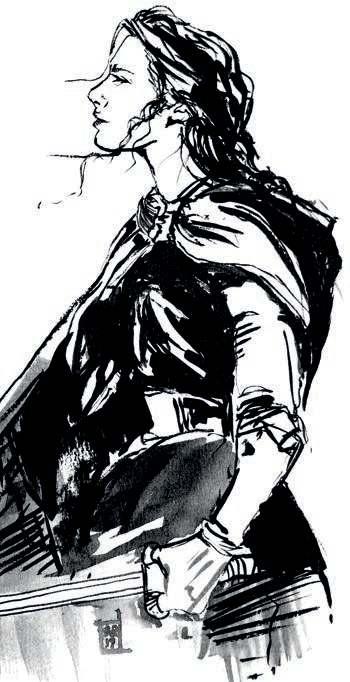
“But wait!” says Amy. “If Sarah is the Drunk, then that must mean Abdallah is lying! We can’t have both a Drunk and a Saint at the same time! It’s Abdallah!”
“I’m sorry, but you are mistaken,” says Abdallah. “I think that Sarah actually is evil after all, and our Undertaker is lying. Trust me.”
“Nope,” says Amy. “I choose to use my Slayer ability on Abdallah.”
The Storyteller enters the circle again and informs the group that, unfortunately, the Slayer has not found her target today. “So,” says Evin, “that means that either Abdallah is good, or Amy is lying.”

“I knew it!” says Ben. “Traitors in our midst! You just can’t trust anyone these days.”
After more chit-chat of this nature, the Storyteller prompts the group to choose a new player to execute. Then, another night begins, where all the players close their eyes, and some players open their eyes to receive information from the Storyteller or to use their abilities while no one else is watching.
If the Demon is executed by the good players, good wins. But if good cannot solve the puzzle in time, and the Demon continues to eat player after player each night for much longer, evil will win. What exciting stuff!

BLOOD ON THE CLOCKTOWER 5
T H E B A S I C S
WHAT IS IN THE BOX?
1 Grimoire (2 pieces)
1 Grimoire stand (2 pieces)
1 Town Square board
4 Plastic sleeves
1 Setup sheet (with rules explanation sheet on back)
1 Traveller sheet (with rules explanation sheet on back)
1 Bag
18+ Shroud tokens
25+ Night tokens
4 Info tokens
2 Metal clips
20 Life tokens
18+ Vote tokens
TRAVELLERS & FABLED
1 Travellers & Fabled character almanac
1 Travellers & Fabled token box
15 Traveller character tokens
14 Traveller reminder tokens
12 Fabled character tokens
11 Fabled reminder tokens
TROUBLE BREWING
1 Trouble Brewing character almanac
1 Trouble Brewing edition box
1 Trouble Brewing night sheet
20 Trouble Brewing character sheets
25 Trouble Brewing character tokens
16 Trouble Brewing reminder tokens
BAD MOON RISING
1 Bad Moon Rising character almanac
1 Bad Moon Rising edition box
1 Bad Moon Rising night sheet
20 Bad Moon Rising character sheets



25 Bad Moon Rising character tokens
42 Bad Moon Rising reminder tokens
SECTS & VIOLETS
1 Sects & Violets character almanac
1 Sects & Violets edition box
1 Sects & Violets night sheet
20 Sects & Violets character sheets
26 Sects & Violets character tokens
37 Sects & Violets reminder tokens
BLOOD ON THE CLOCKTOWER 6
T H E
B A S I C S
WHAT IS THE TOWN SQUARE?
THE TOWN SQUARE IS A BOARD THAT YOU’LL PLACE ON THE FLOOR in the center of the circle of players. You’ll use it to track which players are alive and which are dead with life tokens, placed so they roughly match the seating positions of the players. Life tokens on their top side represent alive players, and life tokens on their underside represent dead players.
When a player dies, you’ll flip their life token and add a vote token to it to show they have one vote left for the rest of the game.

Under the Town Square lies the Traveller sheet. This sheet shows how many characters of which types are in the game, and shows information about the Travellers, a character type often used in games with many players.
H E B A S I C S
Life Token (underside)
This player is dead, and has no vote token.
Life Token
This player is alive.
Vote Tokens (spare)
All spare vote tokens are kept here.
Vote Token
This player is dead, but has one vote left.

Life Token (Traveller)


This player is alive, and is a Traveller character.
Traveller Sheet
This sheet lists how many of each character type is in the game.
ON THE CLOCKTOWER 7 T
BLOOD
WHAT IS THE GRIMOIRE?


THE GRIMOIRE IS THE BOX that the game came in, held together by two metal clips at the top and bottom, forming a container much like an open book. It will help you, the Storyteller, keep track of which player is which, who is dead and alive, who is due to act at night, who is drunk or poisoned, and many other important game conditions.
Only you may look at the Grimoire, and you will use it frequently throughout the game.
Shown here is the recommended way to set up the Grimoire for a right-handed person. If you are left-handed, you may find it useful to switch the contents of the left and right sides.
Character Tokens
Each player is a particular character. In this game, the Investigator is neighboring the Imp and the Undertaker. The Chef and the Soldier are also neighbors.
Shroud Tokens
These mean that the player is dead. In this game, the Scarlet Woman and the Chef are both dead.
The Grimoire‘s left side holds the character tokens for all the characters present in the game, positioned to match the real-world seating positions of the players. You’ll place reminder tokens here to help you remember something that has happened or will happen to a character.

Edition Box
This box contains all not-in-play character tokens and their reminder tokens. In this game, most of these TROUBLE BREWING tokens will not be needed.
Reminder Tokens (active)
These represent something that the Storyteller needs to know about a character. In this game, the Slayer has used their ability, whilst the Undertaker is poisoned by the Poisoner and is safe from the Demon due to the Monk.
BLOOD ON THE CLOCKTOWER 8 T H E B
A S I C S
Metal Clips
These hold the two halves of the Grimoire together. For stability, they are as close to the edges as possible.

Night Tokens
These indicate that a character may need to act tonight. In this game, the living Monk has a night token but the Scarlet Woman does not, because she is dead.

Reminder Tokens (inactive)
These are for in-play characters but are not currently in use.
B A S I C S
Bits ’n’ Pieces
Various tokens—currently not-in-use info tokens, excess night tokens, and shroud tokens. Keep in the bag when the game is packed up.
Night Sheet
This tells you what to do at night time, such as what happens when a character wakes up, and in what order they wake.
The Grimoire‘s right side holds the night sheet, which indicates which characters will wake, and in what order, during the night.
You’ll place night tokens by characters on the night sheet to show their abilities could take effect tonight.

BLOOD ON THE CLOCKTOWER 9
T
H E
YOU CAN SET UP A GAME OF CLOCKTOWER by following the instructions on the setup sheet, which are explained in more detail here.
1. GATHER YOUR PLAYERS. Get one chair per player and arrange the chairs facing each other. A rough circle or square is fine, as long as people are sitting in a definite clockwise or counterclockwise order. As the Storyteller, you will need to be able to enter and exit the circle often, so leave a gap between two chairs. The center of this space will need to be mostly empty— no tables or hazards on the floor which can be tripped on.
2. PREPARE THE GRIMOIRE. Clip the Grimoire by fastening the two metal clips as close as possible to the upper and lower corners of the game box, creating a sturdy book-like container. Unfold and assemble the two-piece Grimoire stand and place the Grimoire upon it, putting it where players that walk around will not accidentally see its contents.
Collect supplies of all the info, night, and shroud tokens anywhere you like in the Grimoire. (We recommend the bottom-left corner of the right side.)

3. CHOOSE AN EDITION. This box set comes with three editions: TROUBLE BREWING, BAD MOON RISING, and SECTS & VIOLETS Choose one to play with. Uncover and add its edition box to the bottom-left part of the Grimoire. (This will let you easily access the character and reminder tokens you need for this game.) Add the night sheet for this edition to the right side of the Grimoire.
You’ll need five or more players for TROUBLE BREWING, and seven or more players for other editions. While you can play other editions with fewer than seven players, this is not recommended. (In five- or six-player games of BAD MOON RISING and SECTS & VIOLETS, characters like the Shabaloth, Goon, Fang Gu, or Evil Twin can give an unfair advantage to one team.)
We recommend you start with TROUBLE BREWING and then move on to other editions. Likewise, we recommend you run a game or two with five to ten players to get the hang of things, then try your hand at larger games.
4. PREPARE THE TOWN SQUARE. Put the Town Square board on the floor in the center of the chairs. Put one life token per player on the Town Square matching their seating position. Put a pile of vote tokens in the center of the Town Square. Put the Traveller sheet partially under the Town Square, showing the number of Townsfolk, Outsiders, and Minions.
5. READ THE RULES TO ANY NEW PLAYERS. The rules sheet describes all the major things that a new player will need to know to start playing. Simply read out the text written on this sheet to the group, or let those who want to read it do so privately.

Part of the rules sheet will prompt you to talk about various hand signals. You’ll want to demonstrate these hand signals as you go, since some players learn visually.
If you wish, you can read out the part of the rules sheet that talks about nominations and executions now, but most players will learn this better if you read it out later on, when the first nomination for execution begins.
There is a duplicate rules sheet on the reverse side of the Traveller sheet, kept under the Town Square. To save time, get a veteran player to read out the rules from this sheet, so you don’t have to. While they are explaining the rules, you can set up the game.

6. SECRETLY CHOOSE CHARACTERS. Take all of the Townsfolk character tokens out of the chosen edition box, and choose the appropriate number for the number of players, as listed on the setup sheet. Put these character tokens in the left side of the Grimoire, and return all remaining Townsfolk character tokens to the edition box. Then, do the same for any Outsiders, Minions, and the Demon. Do this secretly—the players do not know which characters are in the game.
If there are more than fifteen players in this game, then any excess players must volunteer to be Travellers. Travellers have enormous power but less responsibility, and they often help the game go quicker. Give these volunteers the Traveller sheet, so they can choose which Travellers they wish to be. You’ll find more information about them in TRAVELLER CHARACTERS (page 24).
For your first game, we do not recommend that you include Travellers or Fabled.
CHOOSING CHARACTERS. The characters you choose will greatly affect how the game plays. Choose what you think will be fun, what will interact well, or simply what you feel capable of handling. If it is your first game, and you don’t know which characters to include, consider the following (for an eight-player game) or alter one to suit your style:
Chef, Empath, Fortune Teller, Undertaker, Virgin, Drunk (Investigator), Scarlet Woman, Imp. This setup has a lot of information for the good team, and is a great way to get people engaged and talking immediately, but also is relatively safe for evil players that are unsure of how to bluff well. It will be a chaotic game that is a blast for new players. Remember to give the drunk Investigator false information, and remember that they cannot die by nominating the Virgin!
Empath, Fortune Teller, Ravenkeeper, Slayer, Mayor, Saint, Poisoner, Imp. This will be a much quieter game, as players slowly figure out if the Saint, Slayer, and Mayor are telling the truth. The Poisoner, who has many juicy targets, can certainly cause some chaos. However, the game may be a quick one if the Slayer is savvy, if the Saint is not savvy enough, or if the Poisoner cannot find the Empath and Fortune Teller in time. If the Mayor is attacked at night, remember to kill another player instead—perhaps the Ravenkeeper?
BLOOD ON THE CLOCKTOWER 10
R U N N I N G T H E G A M E
SETUP
Washerwoman, Fortune Teller, Undertaker, Slayer, Virgin, Recluse, Spy, Imp. This is a more advanced setup, requiring some deeper logic from the players, but can be very rewarding if they figure it out. Remember that the Recluse can register as the Demon to the Fortune Teller, Undertaker, and Slayer! And remember that the Spy can register as a Townsfolk to the Virgin, Undertaker, and Washerwoman!
7. ADD AND REMOVE CHARACTERS. If any chosen character tokens show an orange flower, you will need to add or remove some character tokens, as described by its almanac entry.
On the character token, the text in square brackets—[like this] briefly describes how to alter the characters in play this game. This happens right now, and does not happen again once the game is underway.
After adding and removing character tokens, the number of character tokens will always equal the number of players.
The Baron token has text that says [+2 Outsiders]. The Baron adds two Outsider tokens to the game, but removes two Townsfolk tokens. Other characters, such as the Drunk, do similar things.


8. ADD REMINDER TOKENS TO THE GRIMOIRE.
If any chosen character tokens show green leaves at the top, add the reminder tokens for those characters to the Grimoire. Return all remaining reminder tokens to the edition box.
The reminder tokens for a character show the same symbol as its character token. The number of green leaves on the top equals the number of reminder tokens that character has: If there’s one leaf at the top, add one reminder. If there are three at the top, add three.

The Investigator character token shows a magnifying glass symbol. Both of the Investigator’s reminder tokens show the same magnifying glass symbol.
9. PASS OUT CHARACTER TOKENS. Shuffle the character tokens and put them in the bag. Then, each player takes one character token out of the bag, and then passes the bag to the next player. Continue this until each player has one token. Each player looks at their character token in secret, revealing it to no one else.
10. ADD THE CHARACTER TOKENS TO THE GRIMOIRE. Collect all the character tokens from the players, and place them in your Grimoire so they match the seating positions of the players.

The safest way to collect character tokens is to ask all players to hold their hand out, with their character token in hand, felt side up, face side down. You can simply grab it from their hand, making sure nobody sees a flash of color as you do so.
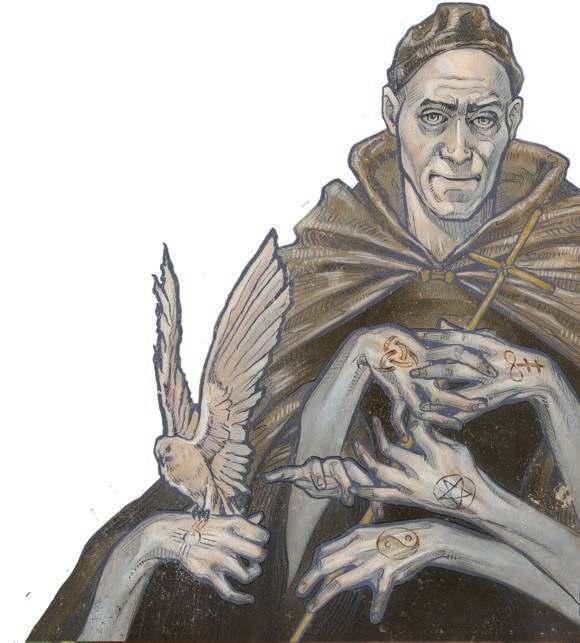
The exact position of each character token in the Grimoire is up to you. If three players are all sitting on the same couch, it is more helpful to group those three tokens close together, in order to remind yourself that they are the couch triplet. As long as the clockwise or counterclockwise order of the players is the same in the Grimoire as it is in the physical space, you’ll be fine.
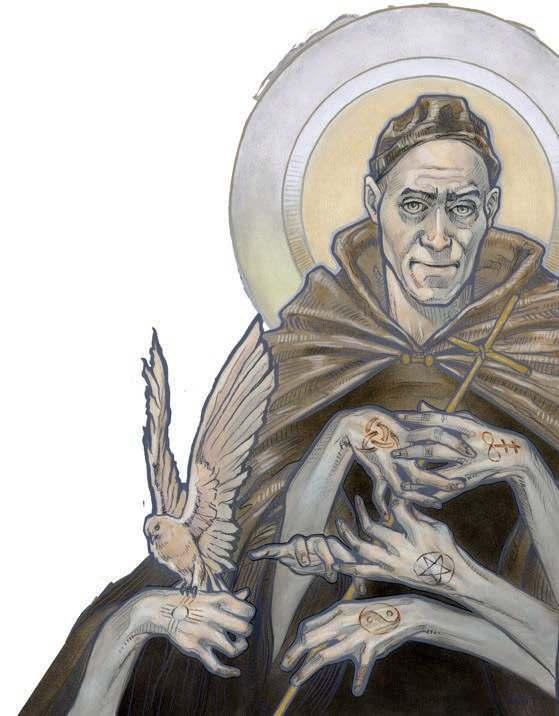
NOW YOU’RE READY TO BEGIN!
R U
N N I N G T H E G A M E
THE NIGHT
PREPARING THE NIGHT
BEFORE RUNNING THE NIGHT PHASE itself, you’ll want to prepare a few things first. Ideally, nights should go quickly and smoothly with a minimum of thinking. If you prepare your night well, you’ve done all your thinking beforehand! Players may talk amongst themselves freely while you are planning the night phase.
First, make sure your night sheet is set up properly. Put it in the right side of the Grimoire.

If this is the first night phase of the game, use the FIRST NIGHT side of the night sheet.
If this is not the first night phase, use the OTHER NIGHTS side of the night sheet.
Add and remove any reminder tokens you need. Place reminders you’ll need tonight in the appropriate positions in the left side of the Grimoire. Place any reminders you won’t need tonight in the right side of the Grimoire.
REMINDERS. How you’ll use each character’s reminder tokens is described in their entry in their character almanac, although they should be fairly obvious. For example, you’ll place the two Washerwoman reminders by the character tokens of the two players that the Washerwoman will learn about during the first night.
Place night tokens on the night sheet, by each character who is acting tonight and by the DAWN entry. Also, add night tokens in the special situations below.
If this is the first night of the game and there are seven or more players, add night tokens to the MINION INFO and DEMON INFO entries on the night sheet. (This will remind you to wake all the Minions and show them the Demon, and to wake the Demon and show them the Minions.)
If there are Travellers in play, then place a night token by the DUSK entry of the night sheet. (At dusk, some Travellers act—a night token here can help you remember to wake them.)


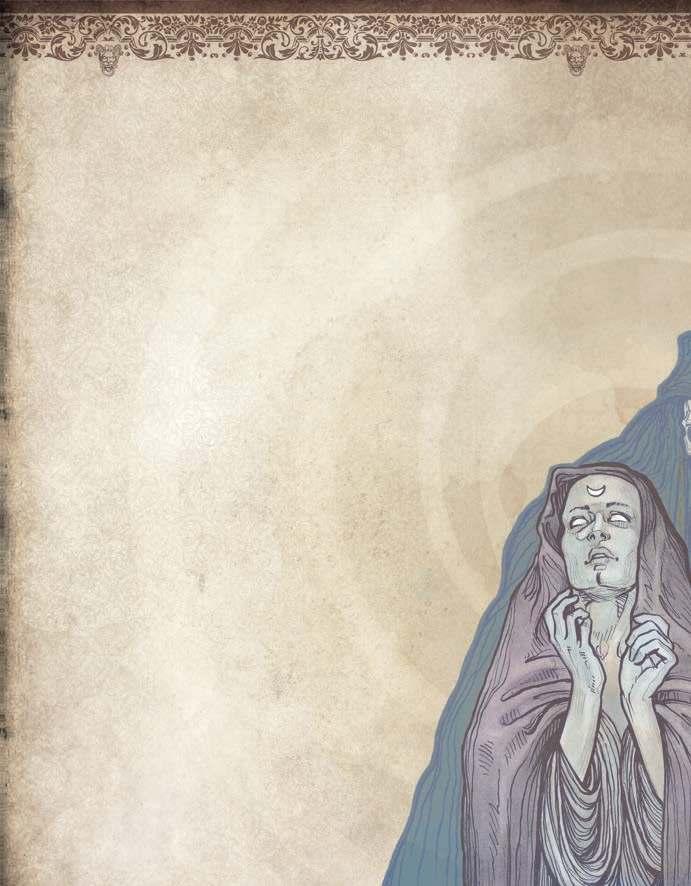

LEAVES. The easiest way to know which characters need night tokens is to look for leaves on their character tokens. A leaf on the left side of the token means that character acts on the first night. A leaf on the right side means that the character acts on all other nights.
PLANNING. This is also a good time to think briefly about what you might need to do in the coming night. For example, if this is the first night, you will show the Demon three not-in-play character tokens to help them bluff. Which tokens will you show them? If a player is drunk and will act tonight, what misinformation will you give them? Knowing what you want to do in advance will help the nights go quicker, which keeps players engaged.
RUNNING THE NIGHT
DURING THE NIGHT PHASE, players keep their eyes closed. Some players will wake, opening their eyes, to learn information or use powerful abilities. Typically the Demon attacks at night, killing one or more players or otherwise causing havoc.
To start the night, tell the players to close their eyes. Say “All players, eyes closed,” or something similar, and check that their eyes are closed if needed. Next, do the actions on the night sheet from top to bottom.
If it is the first night and you are playing with seven or more players, do these two steps:
1. WAKE ALL THE MINIONS AND SHOW THEM THE DEMON. Let the Minions make eye contact so they know who each other are. Then, show each Minion the THIS IS THE DEMON info token and point at the Demon. Make sure all Minions can see who you are pointing to. Then, put all the Minions to sleep.
2. WAKE THE DEMON AND SHOW ALL MINIONS. Wake the Demon, show them the THESE ARE YOUR MINIONS info token, then point to each Minion. Then, show the Demon the THESE CHARACTERS ARE NOT IN PLAY info token, and show the Demon any three good character tokens that are not in play.
BLUFFING. Showing these character tokens will help the Demon bluff as one of them. It is usually best to show two Townsfolk and one Outsider token to the Demon—that way, they can choose among all sorts of characters to bluff as. They can, of course, ignore this advice and bluff as any character they want.
BLOOD ON THE CLOCKTOWER 12
R U N N I N G T H E G A M E
Wake each player who gets to use their character’s ability tonight, one at a time from top to bottom on the night sheet. Resolve their ability, and then put the player to sleep.
As characters act, place reminders as needed. A purple circle next to a character on the night sheet means you may need to put that character’s reminder token somewhere. For example, after the Poisoner chooses someone, put the Poisoner’s POISONED reminder by the chosen player’s character token, to remind yourself that they’re poisoned.
When you reach dawn, simply wait five to ten seconds. Then, declare that the players can open their eyes. Saying “All players, eyes open,” or something similar does the trick.
If any players died at night, declare immediately which players died at night. Do not say which character killed each player. If no one died during the night, say this, but do not say why no one died. You’ll learn about death later in EXECUTION AND DEATH (page 15).


RUNNING DAWN WELL. The small wait at dawn prevents players from knowing for sure whether they were the last to act at night. Likewise, declaring who died immediately prevents players from quickly shouting out “I died! I wasn’t woken last night!” which helps prove that they’re a particular character.
HOW DO I KNOW WHO TO WAKE UP AT NIGHT?
The Storyteller will need to judge from the state of the game whether they need to wake a player up, even if they have a night token on the night sheet. The description of the character itself will say when they will wake up through the course of play.
For example, the Ravenkeeper gets a night token because they might need to be woken, but might not. If the Demon kills the Ravenkeeper, you will wake the Ravenkeeper later that night to give them their information. If the Demon does not, simply skip the Ravenkeeper’s action that night—there is no need to wake them for no reason.




For another example, the Gossip’s ability may kill a player, but the Gossip player does not wake to learn that this has happened.
HOW DO ABILITIES WORK?
Usually, a player wakes, then either chooses a player to affect or receives some information from you via hand signals. Each character’s ability is listed on the night sheet and described in full detail in the appropriate character almanac. You’ll learn far more about abilities in ABILITIES (page 20), but don’t move on to this section until you’ve played a game or two first.
Some characters can kill other characters at night. If a character dies at night before they would wake up, that character won’t wake up. Death is explored further in EXECUTION AND DEATH (page 15).
COMMUNICATING AT NIGHT
YOU WILL USE HAND SIGNALS to communicate to some players at night. Since all players will have their eyes closed during the night, and the player that wakes to act does so in secret, you will be keeping as quiet as possible so as to not reveal their identity to the other players. Any complex questions can be handled in private during the day phase. You can give all these signals with one hand, holding the Grimoire with the other.
EYES OPEN: To wake a player during the night, gently tap them twice on either the shoulder or the knee.
EYES CLOSED: To put a player back to sleep during the night, put your hand over your eyes.
YES: To signal “yes” to a player, nod your head.
NO: To signal “no” to a player, shake your head.

GOOD: To signal that a player is good, give a thumbs-up gesture.
EVIL: To signal that a player is evil, give a thumbs-down gesture.
A NUMBER: To signal a number to a player, hold up that many fingers. To signal a zero, touch your thumb to the tips of your other fingers, forming a “0” shape.
A SPECIFIC PLAYER: To indicate a specific player, point to that player.
A SPECIFIC CHARACTER: To indicate a specific character, show that character token or point to the character icon on their character sheet. (Make sure you hold the token close enough to the player so they can see it—a foot or less is generally close enough.)
If a player is the Empath—who wakes each night to learn how many of their neighbors are evil—and that Empath is sitting next to one evil player, the entire process is as follows:
Tap the Empath’s knee twice to wake them. Hold up one finger to signal “1”. Put your hand over your eyes, to let them know they are to go back to sleep.
Or, if a player is the Ravenkeeper—who wakes up and chooses a player, and learns their character—the entire process is as follows:
Tap the Ravenkeeper’s knee twice to wake them. The Ravenkeeper will point to a player. When they have done so, point to that player too—confirming with them who they are pointing at—then remove that player’s character token from the Grimoire and show it to the Ravenkeeper. Once they have seen it, put the character token back in the Grimoire, then put your hand over your eyes to put the Ravenkeeper back to sleep.
BLOOD ON THE CLOCKTOWER 13
R U N N I N G T H E G A M E
THE DAY

DURING THE DAY PHASE, players talk to each other. They may scheme, lie, share information, or stay silent and try to puzzle out who is who. Then, they vote on who will be executed. This is the main part of the game, mostly handled by the players themselves.
DISCUSSION

TO BEGIN, JUST LET THE PLAYERS TALK amongst themselves. There is very little that you need to do. Players may say whatever they want, or may say nothing at all. Generally, good players will reveal their characters and any information they have, while evil players will pretend to be good characters and give out bogus information. Sometimes good players will be deceptive too. It is up to them.
Players may talk to the group, whisper to each other, or even leave their seats to talk in secret with other players. Encourage them to stay in the circle as they’re doing this, though.

QUESTIONS? Some players will have questions for you. Even though you read out the main rules while setting up, people do forget. Or a player may ask about how a particular character works. Unlike other games, CLOCKTOWER does not require all players to know all the rules before playing. We emphasize participation, so please be as helpful as possible with players who have questions. If you don’t know the answer to a general question, look in the GLOSSARY (page 42). If you don’t know the answer to a character question, look in the appropriate entry of the character almanac.
You can answer questions either publicly, so that all the group hears, or privately. Players with questions about their character’s ability may want to talk in private with you, so that no one else knows who they are or what question they asked.
NOMINATIONS AND VOTING



CALL FOR NOMINATIONS when you feel it is appropriate. Doing so after five to ten minutes of chit-chat is usually about right, but some groups may want to talk for longer or shorter. Make sure everyone is back in their seats at this point.
Say “I now call for nominations,” or something similar. A player can nominate someone by simply saying, “I nominate Bob,” or the like. When you hear a nomination, repeat it back to the group— for example, “Sally has nominated Bob.” This way, everyone knows that you have heard and accepted the nomination. There are a few limitations on nominations, as follows. If a player tries to nominate in a way that’s not allowed, simply tell them it’s not allowed.
Only one player may be nominated at a time. If a nomination has been made but not yet voted on, another nomination cannot be made yet.
Only alive players may nominate. Dead players can be nominated, but this is almost never wise to do.
Each player may nominate only once per day, and each player may be nominated only once per day.
Give the nominated player a chance to defend themself before you start tallying the votes on them. Ten to thirty seconds is usually about right, but longer is okay too.
Tally the votes. Stand in the center of the circle, holding the Grimoire in one hand and holding your other hand out straight toward the nominee. Say the name of the player and that voting has started.



Then, slowly spin yourself clockwise, counting aloud the number of votes as you go, until you come back to the nominee. (Counting aloud helps undecided players make up their minds as to whether to vote or not.) The nominee may vote for themself, if they wish—their vote is counted last. If a player has their hand up when your hand reaches them, that’s a vote. If a player has their hand down, that’s not a vote.
Each alive player may vote for as many players as they wish per day.
Each dead player may vote for only one nomination throughout the rest of the game. Declare the result. The vote succeeds if:
The nominated player got more votes than any other nominated player today, and
The number of votes equals or exceeds half the number of alive players.
It is the middle of the game. Six players are alive, and four players are dead. Doug gets three votes, so the vote succeeds. It doesn’t matter whether the three votes came from alive or dead players— there were three votes, which is half of the six alive players.
If the vote succeeds, declare that the nominated player is about to die. This player will be executed today… unless a future nominee gets even more votes. Call again for nominations and tally the vote for the next nominee, if any. (Any player who is about to die may still nominate if they have not already nominated today.)
If the vote fails, the nominated player will not be executed. You can call for more nominations, then tally the vote for the next nominee, if any.
If the vote ties with a player nominated earlier today, then neither nominated player will be executed. (They are no longer “about to die”.) Call again for nominations and tally the vote for the next nominee, if any. A nominated player must get more votes than the tied number for you to declare they are about to die.
BLOOD ON THE CLOCKTOWER 14
R U N N I N G T H E G A M E
Give a last call for nominations once you feel there have been enough nominations and votes for today. Or if no players have made nominations today, give them this last reminder in case they weren’t paying attention. Step into the circle and say, “Last call for nominations! Three… two… one…” to give the players time to make rash last-minute decisions. If no one makes another nomination, then declare that nominations are closed for today.
EXECUTION AND DEATH
EXECUTE THE PLAYER WHO WAS ABOUT TO DIE Declare that this player dies.
There is only one execution per day. After an execution, the day phase is effectively over.

An execution is not required. If the players decide not to nominate anyone, or the nominees didn’t get enough votes, or the voting ended in a tie between two nominees, the day ends without an execution.
When a player dies, ask the player to flip their life token on the Town Square to its underside and put a vote token on it.
Dead players—whether dead by execution, by the Demon, or by any other means—follow these rules:

Place a shroud token on their character token in the Grimoire.



They immediately lose their ability. Their ability no longer affects the game in any way and they are not woken during the night to act, so remove their reminder tokens and night token, if any.
They cannot nominate, and they may only vote once for the rest of the game. When they choose to vote, they remove their vote token from their life token. Dead players without a vote token cannot vote.



They still close their eyes during the night, and may still talk as much as they want. In fact, because the dead players have a voice and a vote, it is usually the dead players who decide the final fate of the town. Dead players win if their team wins, and lose if their team loses, just like alive players.
WHEN A PLAYER DIES, IS THEIR IDENTITY REVEALED? No. Some Storytellers more familiar with other social deduction games have a habit of telling the group which character the dead player was playing. In CLOCKTOWER, the identity of the dead remains a mystery. Dead evil players may still wreak havoc if they are believed to be good.
After the execution phase is over, take thirty seconds or so to prepare your night phase. Some reminder tokens and night tokens may need to be added or removed. When you are ready, declare that the day is over, and ask all the players to close their eyes.
U N N I N G T H E G A M E

BLOOD ON THE CLOCKTOWER 15
R
ENDING THE GAME
ONCE THE FIRST NIGHT PHASE IS OVER, go to the day phase, then the night phase again. (Remember to flip the night sheet over to the OTHER NIGHTS side and rearrange the night tokens accordingly at the end of your first day phase.) Repeat this until one team wins and the game ends.
In Ravenswood Bluff… death is not the end. If the good team wins, all good players win, whether alive or dead. If the evil team wins, all evil players win, whether alive or dead. One team wins, and the other team loses. There are never any neutral players. Good wins if the Demon dies. Declare that good has won, and encourage any handshakes, hugs, or screams of joy that you wish.

Evil wins if there are only two players left alive. Declare that evil has won, and encourage any fist bumps, finger guns, or debauched partying that you wish. (Evil could win either because the Demon killed a player or the wrong player was executed.)
If both teams would win at the same time, good wins. For example, if the Demon dies but that leaves only two players left, the good team wins.
DOES THE GAME ALWAYS END WHEN THE DEMON DIES? Nope! Some characters, such as the Scarlet Woman, keep the game going after the Demon dies, without the good team knowing what has happened.

In some intermediate and advanced editions, multiple Demons can be alive at once. All Demons must die for good to win. Also, some Demons might be good rather than evil. The good team still only wins when all the Demons are dead, regardless of whether they are good or evil.

ON THE CLOCKTOWER 16
BLOOD
R U N N I N G T H E G A M E



BLOOD ON THE CLOCKTOWER 17 R U N N I N G T H E G A M E


If you have read the previous chapters in this rulebook and the TROUBLE BREWING character almanac but would like a little practice before running your first game, visit bloodontheclocktower.com/quiz. There, you’ll find multiple choice questions and a digital Grimoire designed to help you understand how each character works and interacts with others. Everything you need to know is in the physical rulebooks in the box, but the online quizzes are a fun way to put this knowledge into practice.
In this chapter, you’ll learn the deeper rules surrounding the characters’ abilities and how they work in unusual timing situations, when players change characters, or when drunkenness and poisoning operate in unusual ways. You’ll learn the rules for states—drunkenness, poisoning, madness, character, and alignment. Finally, you’ll learn about Travellers and Fabled— characters that drastically change the game in one way or another.
In the following chapters—GREAT STORYTELLING and GOING FURTHER—you’ll learn all sorts of tips and tricks on how to improve your storytelling abilities, create your own custom games, run small Teensyville games, and more. Also, you’ll learn more about the various editions!
While this rulebook provides the general rules for the game, there are some exceptions to keep in mind:
If the rulebook doesn’t say you can’t do something, you can do it. Yes, players can nominate or vote for themselves. Yes, the Demon can attack dead players. Yes, good players can lie. Yes, if you get to choose “any player” at night, you can choose yourself or a dead player. Yes, the dead can talk. No, dead players cannot nominate, and may only vote to execute if they have a vote token.


Your word is law. If you are unsure of how to interpret a rule, or the players are unsure of what a character’s ability does, you, the Storyteller, are the final judge. Listen to the players, by all means, but when you’re unsure what the gods of CLOCKTOWER really meant by that strange wording or character combination, make a call and stick by it. Tell your players what your judgment is, and play on.
Character abilities break the core rules in this book. If a character’s ability contradicts a core rule in this book, follow the character’s ability. There is one exception: abilities cannot affect the exiling of Travellers (page 25).
WELCOME TO THE NITTY-GRITTY ...and beyond. You don’t need to read further until you’ve run a game or two or until you run into a thorny rules question.
ABILITIES
EACH CHARACTER IN BLOOD ON THE CLOCKTOWER HAS A UNIQUE ABILITY, as described on their character token, character sheet, and character almanac. The character token and character sheet give plain-language versions of the abilities that will serve you well in almost all cases, but if you run into a conflict or strange interaction between abilities and need to find a more specific explanation, follow the rules written in their character almanac.
When used, abilities work immediately. For example, if the Demon attacks the Fortune Teller, the Fortune Teller dies immediately—they do not get to wake up later that night to use their ability. Or if the Monk wakes up and protects the Empath, then the Demon wakes up just after that and attacks the Empath, the Empath does not die.
Only tell a player what their own character’s ability says they learn. Secrets are secret. If the Imp dies and the Scarlet Woman becomes the Imp, do the other players learn that this has happened? No. If the Slayer uses their ability and nothing happens, do the players learn that the Slayer is the Slayer? No. If the Monk protects the Washerwoman, does the Washerwoman learn that she was protected? No. When the night ends, do players learn which ability killed which player? No, they only learn which players died, not how.
Abilities are lost immediately on death, poisoning, or drunkenness. If a character dies, they lose their ability immediately and any of its persistent effects end, so you can remove their reminder tokens. For example, if a Poisoner poisons the Slayer at night, then the Poisoner dies later that same night, the Slayer is no longer poisoned. Even though the Poisoner’s ability says that it lasts “until dusk”, once the Poisoner dies, they lose their ability and its persistent effect ends.
If a player becomes drunk or poisoned, you can remove their reminder tokens. However, it is sometimes more helpful to not remove them and instead turn them upside-down, in case the player becomes sober and healthy again.



You can ignore these reminder tokens for the time being since drunk or poisoned players have no ability, as if they were dead. For example, if the sober Innkeeper protects the Chambermaid, but then the Innkeeper becomes drunk, the Chambermaid stops being protected. Or if Julian poisons Amy, and then Evin poisons Julian, then Amy is no longer poisoned.
Some characters keep all or part of their ability when they die. If the ability says “even if dead” or happens when the character dies, it does so. This ability is still lost if the player becomes drunk or poisoned.
The Ravenkeeper is killed at night, then uses their ability. Their ability says “If you die at night, you are woken to choose a player: you learn their character.” Even though the Ravenkeeper is dead, they still have their ability for a short while, because their ability says it happens when the Ravenkeeper dies.
If an ability does not say “choose” the Storyteller makes the decision. For example, if an ability says “A player is poisoned each night”, then the Storyteller chooses who. If the ability says “Each night, choose a player: they are poisoned”, that means that character’s player chooses.
If a player tries to use their ability incorrectly, let them know. Tell them verbally if it is day, or shake your head if it is night. The Monk cannot choose themself, so if the Monk player chooses themself, shake your head no, then motion for them to choose a different player. The Chambermaid must choose alive players, so if the Chambermaid player chooses a dead player, shake your head no and motion for them to choose again.
If a player becomes a new character, they gain the new character’s ability immediately. They lose their old ability immediately and any of its persistent effects end. If the new ability is a “once per game” ability and has already been used, they may use it again. If the new ability normally only functions on the first night, it functions tonight. Players that are brought back from the dead, or players that become a new character via a character swap, gain their ability in this way too.
If a player becomes a Minion or Demon character, they do not learn who the other evil players are. That information is for the evil players at the beginning of the game, and has nothing to do with abilities.
If a player becomes a character whose ability text has square brackets—[like this]—that portion of the ability has no effect. Square brackets indicate a different game setup, and this is not changed mid-game.
Some abilities may happen at a different time than what is listed on the night sheet. The night sheet lists which characters act in what order, but some abilities may take effect earlier or later, such as when an ability triggers immediately when a character dies. The night sheet order is a guide to remind you to wake players and to place reminder tokens and shrouds, so that no character is forgotten. The ability text on the character token is more important than the order of resolution on the night sheet.
The Demon kills the Sage. The Storyteller should wake the Sage immediately, but forgets. The next character on the night sheet to act is the Sweetheart. The Sweetheart died today. The Storyteller forgot to make a player drunk as soon as the Sweetheart died, so they do so now. The next character on the night sheet to act is the Sage. The Storyteller wakes the Sage and resolves the Sage ability.
BLOOD ON THE CLOCKTOWER 20
T H E N I T T Y G R I T T Y
-
IN BLOOD ON THE CLOCKTOWER, PLAYERS CAN BE LOTS OF THINGS—this character or that one, drunk or sober, alive or dead, healthy or poisoned. (Of course, we don’t mean literally.)



These are called states. Basically, they’re permanent elements of a player that are independent from each other. For example, if you’re drunk and change your character, you stay drunk. If you’re poisoned, you can be drunk too.
LIFE AND DEATH

AT ANY GIVEN TIME, a player is either alive or dead
Generally, players die during the day from execution and die at night from characters’ abilities.
Execution is different from death. Sometimes, a player may be executed but remain alive rather than die. Players may be executed multiple times, and even dead players may be executed again, just to be sure. Regardless of whether the group executes an alive or dead player, this counts as the one execution allowed for the day.
A dead player cannot die again. If a dead player is attacked by the Demon, for example, they do not die again, and the group does not learn that they died last night.
ALIGNMENT AND CHARACTER
AT ANY GIVEN TIME, a player is either good or evil
Characters start as either good or evil, but their alignment may change. Sometimes, a Townsfolk will be evil. Sometimes, a Demon will be good.
If a good player has an evil character, or an evil player has a good character, turn their character token upside-down to remind yourself that the player’s alignment is the opposite of the color of the token.
Character is independent of alignment. If a player changes alignment, their character stays the same, and vice versa. For example, if the Goon becomes evil, they’re still the Goon. Or if the Pit-Hag turns the good Juggler into the Witch, then the Witch is still good.
The player learns of changes… If a player’s alignment or character changes, they learn this at the earliest opportunity, in secret. You will usually show the YOU ARE info token and then their new character or alignment. The night sheet or character almanac will tell you when an alignment or character changes, prompting you to wake the changed player and inform them.
Learning a new character or alignment isn’t information in the normal sense. It is not affected by drunkenness or poisoning, or by characters such as the Vortox. This is so that players know their own alignment and character.
…with a few exceptions. Sometimes, a player thinks they are a character or alignment that is different from their true character or alignment. For example, the Drunk and the Lunatic are designed to not know who they really are.
DRUNKENNESS AND POISONING
AT ANY GIVEN TIME, a player is either sober or drunk, and either poisoned or healthy. Being drunk and being poisoned do the same thing. Alive and dead players alike can be drunk or poisoned.
A drunk or poisoned player has no ability. A drunk Slayer cannot slay anybody, a poisoned Demon cannot kill anyone, a drunk Virgin cannot cause an execution with their ability, a poisoned Courtier cannot make anyone drunk. If a player tries to use their “once per game” ability while drunk or poisoned, they do not get to use it again. It is gone.
They can get their ability back. If a drunk player becomes sober again, or if a poisoned player becomes healthy again, they regain their ability. That said, if they used their “once per game” ability already, then tough luck.
Do not tell them they are drunk or poisoned! Instead, act just like they’re sober and healthy. For example, a drunk Monk still wakes each night and chooses a player to protect… but that player won’t be protected. A poisoned Demon still wakes to attack a player, but nobody dies, and the Demon won’t know exactly why. Sometimes you may want to hint to them that they are drunk or poisoned, such as by showing the Undertaker that the Mayor got executed when nobody is claiming to be the Mayor, but such times are exceedingly rare.
You can give them false information. A drunk or poisoned player does not have an ability, but they think they do. If their ability gives them information, you can give them incorrect information. For example, a drunk Empath still wakes each night and gets shown a finger signal, but you can show the wrong number of fingers. A poisoned Undertaker gets shown the character token of the player who died by execution today, but you can show the wrong character token. You’re not required to give incorrect info, but you can—and you usually should!
Drunkenness and poisoning do not cancel out. drunk does not become sober or healthy! They’re just both poisoned and drunk.
Abilities used on a drunk or poisoned player work normally. For example, an Empath correctly learns the alignment of their drunk neighbors. A Fortune Teller correctly identifies a poisoned Demon. If the Duchess—a Fabled character that grants information to three players—is visited by a poisoned Slayer, then the Slayer gains correct information. In this case, the Duchess’s ability is working properly, while the Slayer has no ability.
BLOOD ON THE CLOCKTOWER 21
T H E N I T T Y G
-
R I T T Y STATES
Always give correct information about the rules, even to drunk or poisoned players. They need to be able to trust you at least that much.
The player is drunk or poisoned, not the character, even though it is common to refer to a drunk or poisoned character. If a drunk player becomes a new character, they are still drunk. If a poisoned player swaps characters with another player, the player remains poisoned.
The timing of drunkenness and poisoning can vary slightly with unusual character combinations. Normally, if an ability is a permanent ability or is already affecting the game, the player loses their ability when they become drunk or poisoned, and that ability resumes when they become sober and healthy again.
The Tea Lady is poisoned, so she does not protect her neighbors. Later, the Tea Lady becomes healthy, so she protects her neighbors again.
The sober Witch has cursed a player. The Witch becomes drunk, so that player is not cursed. Later, the Witch becomes sober again, so that player is cursed again.
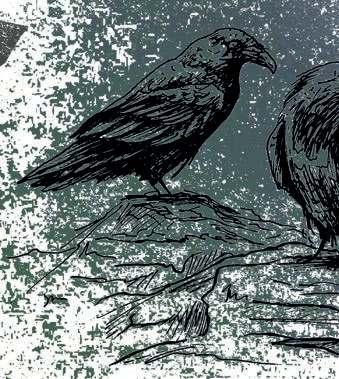
If an ability is triggered or used when the player is drunk or poisoned, the ability is wasted. It has no effect now, and no effect later on, even if the player later becomes sober and healthy.
A poisoned Sweetheart dies. The Sweetheart does not make a player drunk, even if the Sweetheart becomes healthy later on.
A drunk Innkeeper chooses two players to protect. They are not protected, even if the Innkeeper becomes sober later on.

If an ability is triggered or used when the player is sober and healthy, the ability works normally, even if the ability relies on some condition being true in the past and the player was drunk or poisoned at that time in the past.


A sober Juggler wakes at night and learns correct information, even though the Juggler was drunk when they made their guesses earlier that day.
CLOCKTOWER is designed so that such odd timing situations are rare. When in doubt, refer to the character’s almanac entry for clarification.
TIPS. To run drunkenness and poisoning well, listen to the bluffs of the evil players, and support those bluffs wherever possible. For example, if the drunk Ravenkeeper chooses to learn about Doug, who is the Baron but bluffing as the Mayor, you can help the evil team if you show the Ravenkeeper the Mayor token. If the drunk Ravenkeeper instead chooses to learn about a good player, it can be helpful to show an evil character token instead. Normally, you should make drunkenness and poisoning as harmful as possible to the drunk or poisoned player.
MADNESS
MADNESS IS INTRODUCED in the SECTS & VIOLETS edition. It’s fairly rare, with only about a dozen characters that cause madness over the many editions. It is more like a realworld state than a game-state. You cannot look in the Grimoire and see which characters are mad or not, but you can watch and listen to what people are saying to determine if players are mad or not.
When a player is mad about something, that means they’re trying to convince the group that something is true. Some players are instructed to be mad about something, and some players are instructed to not be mad about something.
When a player is instructed to be mad about something, but they aren’t, the Storyteller might give them a penalty. Likewise, if they are mad about it, the Storyteller might give them a bonus. The specific instructions, benefits, and penalties of madness are written on the character token or character sheet.
The Mutant’s ability is “If you are ‘mad’ about being an Outsider, you might be executed.” Alex, the Mutant player, is trying to convince the group that he is the Mutant, an Outsider character, so he is mad about being an Outsider. Alex might say something obvious, like “I am the Mutant!” or “I am not a Townsfolk… but I’m not going to tell you my character.” In either case, the Storyteller is welcome to execute him.
Alex may instead try something more subtle. He might say something like “I am not going to tell you who I am, but I’m definitely not the Mutant,” with a mischievous grin on his face, or he may even say nothing at all while other players accuse him of being the Mutant. In either case, the Storyteller may judge that Alex is trying to convince the group that he is the Mutant. In the first case, he is saying one thing and meaning another. In the second case, he is saying nothing at all but hoping that, because of it, the group will conclude that he is the Mutant. In either case, the Storyteller might execute him.
Similarly, even if the Storyteller doesn’t spot Alex telling anyone that
BLOOD ON THE CLOCKTOWER 22
T H E N I T T Y G R I T T Y -
The Cerenovus’ ability tells a player that they should be mad about being a specific character or else they might be executed. The Cerenovus chooses Sarah to be mad about being the Sage, so Sarah should do her best to convince the group that she is the Sage, or else she risks being executed.

Sarah simply sits there and says nothing, so she has certainly acted the way a Sage would act—staying quiet—but she has not tried to convince the group that she was in fact the Sage. Something much more convincing would be required—a great start would be saying “I’m the Sage. I lied about who I was yesterday so that the Demon would attack me, but alas, it didn’t work. But, yes, no lies, I am the Sage.” Instead, Sarah stays quiet, and because the Storyteller believes that Sarah isn’t trying very hard to convince people that she is the Sage, the Storyteller is free to execute her.
Players are never forced to be mad. Players may say whatever they want at any time—they are never compelled to say anything they do not wish to say. With madness, however, they are incentivized to say particular things and disincentivized to say others. If a player flat out says, “I am mad,” or otherwise heavily implies it, then the Storyteller can give them the appropriate penalty or remove the appropriate benefit. This kind of statement is usually a player’s way of saying “I do not wish to be mad about this thing, and I would rather take the penalty.” Even if a player merely implies that they are mad, that counts.
A previously mad player can talk about it without penalty. Once they are no longer mad, players can let the group know that they were mad without suffering the consequences. For example, a player that was picked by the Cerenovus two nights ago, but not last night, can happily tell the group this without fear of execution. A dead Mutant no longer has their ability, so need not fear its consequences.
You, the Storyteller, are the final judge about who is and who is not behaving madly. There are no rules about what must or must not be said. What matters is what you think the player is trying to do
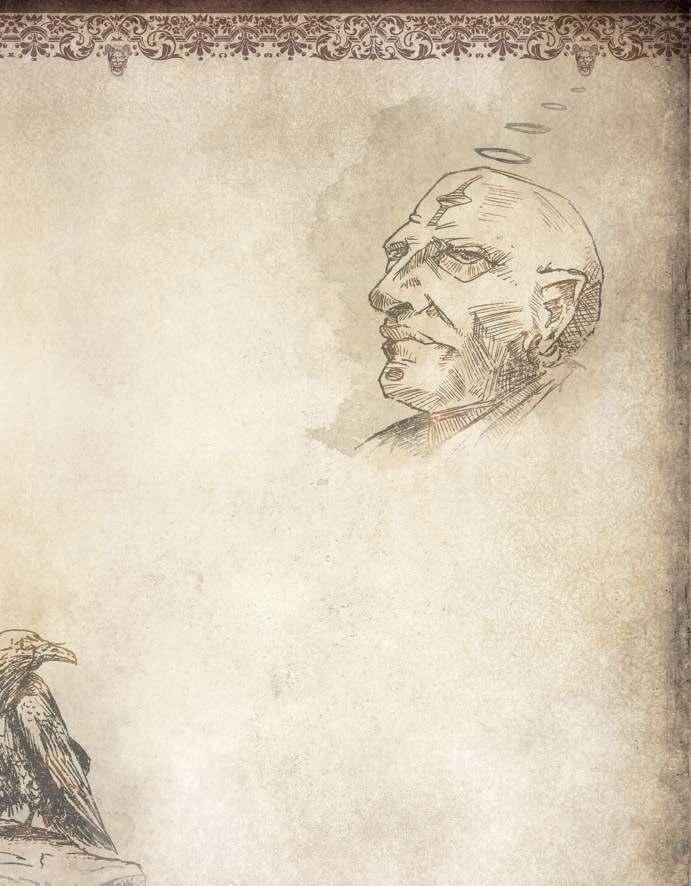


Returning to the Mutant example above, if you think that the player is genuinely trying to convince the group that they are not the Mutant, they are not mad about being the Mutant. But if you think they are trying to convince the group that they are an Outsider, however subtly, then it’s curtains for them. Execute them at will.

Returning to the Cerenovus example above, if you think that the player instructed to be mad by the Cerenovus is genuinely doing their best to convince the group (verbally) that they are the Sage, then they are mad that they are the Sage, and therefore safe. But if you believe that they are just half-heartedly saying a few token words, and that they pretty much expect to be disbelieved, or even if you think that they are doing their best to be disbelieved, then they pay the penalty of being executed at your leisure.
Generally, be firm in your judgment. If players come to believe that all they need to do is put in a half-assed effort to avoid the madness penalty, then that’s what they will do. It’s not the end of the world if this happens, but the fun in being mad is in being incentivised to spread lies and misinformation to your own team and to not be able to own up to it until you are sane again!
when deciding whether or not to penalize a player for madness.
For example, if Abdallah, an advanced player, is instructed to be mad about being the Flowergirl, then he better be telling the group which days the Demon voted and did not vote. If Abdallah was truly the Flowergirl and had revealed his character to the group, there would be little reason for him to withhold his Flowergirl information. Abdallah is an advanced player, so he should not be getting any free passes. If he puts in a solid effort in convincing the group he actually is the Flowergirl, then he lives! Beginner players should be given a little more leeway. As long as you believe they are putting in a genuine effort to convince the group, then you can be more forgiving. Players don’t have to actually convince anyone in order to count as mad... they just need to put in a sincere-looking effort.
BLOOD ON THE CLOCKTOWER 23
-
TRAVELLER CHARACTERS
TRAVELLERS ARE CHARACTERS FOR PLAYERS who turn up late or will need to leave early. Travellers tend to have extremely effective abilities but gain little information. They have maximum power and minimum responsibility.
ADDING TRAVELLERS
To include a Traveller in your game, do the following:
1. LET THE PLAYER CHOOSE A TRAVELLER. Take the player aside and give them the Traveller sheet, which is kept under the Town Square. This sheet details which Travellers are available for this game and what their abilities are. Ask the player to choose one Traveller to play.
The five recommended Travellers for TROUBLE BREWING are the Scapegoat, Beggar, Gunslinger, Bureaucrat, and Thief. These characters all work well for the edition you are playing. You can offer Travellers that are recommended for a different edition instead, but they may not interact well with the characters in the edition you are playing. For example, if you add an evil Judge to TROUBLE BREWING, they can use their ability to automatically execute the Saint and end the game, which is unfair for the good team. Use your judgment about which Travellers you wish to include if you go outside the recommended five.
2. CHOOSE ALIGNMENT. Tell the Traveller player in private whether they are good or evil. If you made the Traveller evil, they learn which player is the Demon, but not which players are the Minions.
3. ADJUST THE GRIMOIRE. Prompt the Traveller to sit down, then put their Traveller character token in your Grimoire to match their seating position. Put evil Traveller tokens upsidedown and good Traveller tokens right-way-up.
4. PLACE THEIR LIFE TOKEN. Put the Traveller’s life token on the Town Square. The Traveller’s life token is a different color. (This represents that they are a Traveller, and it helps the other players remember that Travellers do not count as players for evil’s “win when two players are alive” victory condition.)
5. INFORM THE GROUP. Declare that a Traveller is now in play, which player and which character they are, and what their ability is. (Do not declare their alignment.)



Travellers may enter the game at any time. Since CLOCKTOWER games usually go for about an hour and can include up to twenty people, someone who turns up ten minutes late can join in the fun when they arrive. They can play a Traveller even if they join five minutes after you’ve set up the game, but before you start the first night—just make sure they close their eyes on the first night, then let them choose a Traveller on the first day.
That said, we don’t recommend adding Travellers if the game is nearly finished. Consider adding a Traveller only if seven or more players are alive. Adding a Traveller to the game on the last day, or even the second-to-last day, may lead players to feel that their win or loss was due to an unfair last-minute addition, not their own efforts.
Travellers can join the game before the first night, if you wish. They will act on the first night if so. For all games larger than fifteen players, Travellers are included in the game and begin at the same time as the other players.
If a player needs to leave before the game ends, and is kind enough to tell you while you’re setting up the game, you can give them a Traveller instead. This player may leave at any time— when they do, simply remove their character token from the Grimoire, and remove their life token from the Town Square. We recommend giving Travellers to these players because a game cannot continue if the Demon leaves partway through… and you never know which player will be the Demon.
Make Travellers good most of the time. You want to keep the game balanced, so Travellers should be evil only about a third of the time, since an evil Traveller gives the evil team an extra vote, which is very powerful. Adding multiple evil Travellers can be devastating. Adding multiple good Travellers does give the good team some extra votes, but the good Travellers do not know who is good or evil, unlike the evil Travellers.
So, if just one Traveller joins the game, they should almost always be good. If two Travellers join your game, they can both be good, but it is usually most interesting to make one of them evil. If three, four, or five Travellers enter the game, making one or sometimes two of them evil is usually about right.
However, this is totally up to you. If you are running a game with fifteen players, and eight players are still alive, but all the Minions are dead, feel free to make more Travellers evil than usual. Or if the good team is getting hammered, make all the Travellers good. Every so often, though, make the only Traveller in a game evil, just to keep the players guessing about what you are up to!
RUNNING TRAVELLERS
TRAVELLERS WORK THE SAME AS OTHER CHARACTERS in most ways. They may nominate, may vote, may act at night, may be killed by the Demon, register as normal characters, lose their abilities when dead or drunk or poisoned, and even get a vote token when they die. For example, an Empath sitting between two Travellers will detect the alignment of those Travellers. If the Demon attacks a Traveller, that Traveller dies. Travellers differ from normal characters only in the following few ways.
Travellers do not count when determining whether the evil team wins from just two players remaining alive. For example, if five players are still alive, but three of them are Travellers, then evil wins.
WHY? This rule exists because everybody knows that Travellers cannot be the Demon. Since they arrived late, the Demon was already decided upon. Travellers get a life token of a different color to put on the Town Square to remind everyone of this.
BLOOD ON THE CLOCKTOWER 24
T H E N I T T Y G R I T T Y
-
Travellers are exiled, not executed. Anytime during the day, any player can call for an exile of a Traveller, forcing them to die in the wasteland beyond. Any player, even a dead one, may call for an exile. They may do so before the Storyteller has asked for nominations, or afterward, when nominations normally occur. Calling for an exile is not a nomination, so a player who calls for an exile may also nominate someone on the same day.
When a player calls for an exile, all the players decide on whether they support or oppose the exile. This group decision works the same as a vote for execution—with players raising hands, counted by the Storyteller—but it is not considered a vote.
Any player, even a dead one, may support the exile of a Traveller. Dead players that support an exile do not lose their vote token.


The process to exile a Traveller is not affected by abilities. It is purely a group decision. For example, characters that modify
votes (Thief, Bureaucrat, etc.) do not modify support for exile. Even the Butler may raise their hand to support an exile without their Master raising their hand.
If at least half of the players support the exile, it succeeds, and the exiled Traveller dies. This counts the total number of players in the game, not the number of alive players. If an ability prevents the exiled Traveller from dying, they live.
Any number of Travellers may be exiled in a day. Exiles are not executions, so an execution may still occur today.
Like in executions, each Traveller can only be called to be exiled once per day. The players may believe that a Traveller is evil and want to kill them, but if there is not enough support to exile them today, then they will have to try again tomorrow.
Normally, Travellers cannot become non-Traveller characters, and non-Travellers cannot become Travellers. If a player tries to do this via their ability, shake your head “no” and motion for them to choose again. (This is because Traveller players may want to leave the game early, but cannot do so if they become non-Traveller characters. Also, the game can become unbalanced—and even sillier— if players become Travellers all the time.)
However, you may wish to allow this. If you are open to experimentation and you feel this would make the current game more fun, then allow abilities (such as the Barber) to turn Travellers into non-Travellers, and non-Travellers into Travellers. When this happens, any player that becomes a Traveller swaps their normal life token for a Traveller life token, and any player that becomes a non-Traveller character swaps their Traveller life token for a normal life token. All players always know which players are Travellers and which are not.
For more information on what specific Travellers do and how they can benefit your game, read the TRAVELLERS & FABLED almanac.
FABLED CHARACTERS
THE FABLED ARE FOR YOU, THE STORYTELLER. They’re more like special rules than characters all on their own. They let players join in a game of CLOCKTOWER when they would otherwise not be able to, or they help the game run smoother when a real-world issue comes up. The Fabled fix problems that are outside the usual boundaries of the game. For example, if a player has an intellectual disability that would normally mean they couldn’t understand the game rules or communicate with the group, a Fabled can allow them to join in. If a new player is worrying they will die early, a Fabled can protect them. If there are too many players for the time available, a Fabled can make the game run faster. If someone is shy or softspoken and has trouble getting the group’s attention, a Fabled can give them the floor without interruption. If the game needs to end earlier than expected, a Fabled can decide a winner.
If you’ve made your own character list using the Script Tool (page 36), a Fabled can help make it more fun.
Use the Fabled only when you need them. They can be incredibly useful in making your games more enjoyable and
-
accessible to players of all sorts, but adding them willy-nilly to every game is unnecessary and gets old quickly.
To include a Fabled in your game, simply choose one, tell the group which Fabled is in play, and put the Fabled character token in the center of the left side of the Grimoire as a reminder about what the character does. Some Fabled are added at the start of the game, while others can be added and removed at any time.

You may add multiple Fabled if you wish.
The Fabled cannot die or lose their ability. You are the Storyteller, not a player, so your Fabled are immune to all game effects, including death, drunkenness, and poisoning.
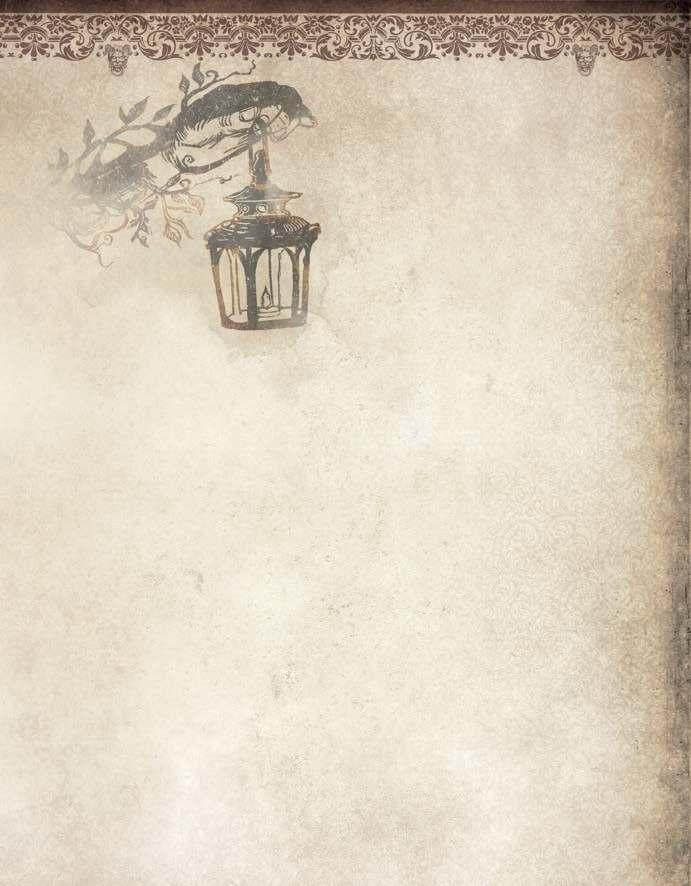
Like Travellers, the Fabled do not count as players for the “two players remain alive” victory condition for the evil team.
For more information on what specific Fabled do and how they can benefit your game, read the TRAVELLERS & FABLED almanac.
BLOOD ON THE CLOCKTOWER 25
T H E N I T T Y G
R I T T Y


Fortunately, the collective knowledge of those who walked this hallowed path in aeons past is presented in this following chapter. If you’re looking to become a storytelling stallion, a purveyor of positive pastimes, and a true titan of the Town Square, then this is for you.


You’ll find relatively little pertaining to the rules here, and certainly nothing that is required to run the game. However, as the bards and poets of old knew, spinning a tantalizing yarn is about so much more than simply reciting information.
As the Storyteller you are not just the referee, but the coach, commentator, and cheering fans all rolled into one.
You hold your players’ trust in your hands, which is both a responsibility and an opportunity. In the following chapter you’ll find a large number of tricks and tips aimed at enabling you to take what you’ve learned from the rules and shape that knowledge into a memorable and satisfying experience for your intrepid players. These are separated into the following two sub-categories:
RUNNING THINGS SMOOTHLY discusses things like when to end the game, how to easily interact with players during both the day and night phases, how to get the most out of your Grimoire, where to physically position yourself and your players, and what to do if things go awry.
MAKING THINGS FUN looks at how and when to add creative flair to your storytelling, dealing with problem players and taboo subjects, strategies for crafting epic experiences, and how to get the most out of the melting pot of personalities that every game involves.
If you’re running games for newcomers, trying to grow your ensemble of players, or simply want to tighten up your storytelling, then this next chapter contains everything you need to get started on those journeys.
GREAT STORYTELLING is about going beyond the written word. The truth is that you already are a great Storyteller. You just need to unlock your magnificence via the inevitable experience that comes with running games.
RUNNING THINGS SMOOTHLY
YOU CAN END THE GAME WHEN VICTORY IS CERTAIN for one team. If all remaining players are evil, then good cannot nominate the Demon, so you can declare that evil wins. Almost every time when there are four players left alive, and the good players execute a non-Demon player, you can end the game there. If you were to continue the game after this execution, with just three players alive, then the Demon would kill one of those players at night, ending the game. There is little point in going through this process, as evil already knows they have won. However, if a Monk or a Soldier is still alive, then the Demon may not end up killing a player that night, leading to another day of executions after all.
Use your best judgment when declaring the game over early. If there is any way for the losing team to win—however unlikely it is—then keep the game going.
During the night, confirm players’ choices with a downward finger point. Sometimes, players will point at another player very quickly, or will point from an angle that makes it hard for you to determine which player they want to choose. Instead of guessing their intentions, walk to the player you think they chose and point vertically down at the chosen player, with your hand above them. This makes it very clear to the choosing player that you want to confirm their choice. The choosing player nods to you. You nod to the choosing player. You both understand exactly which player is the target.
This practice, or whatever works for you, is a good habit to get into, as it avoids easy misunderstandings.
Moving tokens around in the Grimoire is something you may need to do when good players such as the Slayer or Juggler use their abilities. When evil players bluff as these characters, pretend to move tokens around the Grimoire in the same manner. Veteran players will not be able to tell by looking at your hand motions whether the player in question is bluffing or not.
Quietly tap the shoulders or knees of players that need to wake. If your tapping makes noise, neighboring players may hear it and get suspicious of the tapped player. If the player is wearing thick clothing and cannot feel light taps, then press down noticeably with your hand twice instead.
Point to the ability text on the player’s character sheet, if you wake a player at night for them to act and they look like they don’t know what to do. Some new players forget that their ability works at night, or how it works. Simply pointing to the text on the character sheet is usually enough for them to understand why you have woken them.
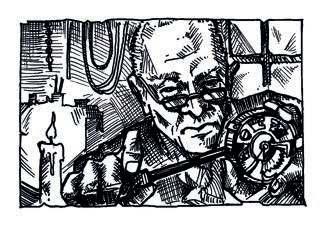
Keep the Grimoire level when moving about. The high sides of the Grimoire should keep its contents hidden from the players as long as you don’t tip it at a steep angle. Players need to be seated with their eye level below the top of the Grimoire in order to avoid accidentally seeing inside.



Hold the Grimoire by the central spine from above or underneath. This way, you can have a free hand to move tokens around. Don’t hold the Grimoire by the left and right edges alone, as this will cause the book to snap closed... which could send tokens flying everywhere!
Transport your Grimoire with the spine facing down. If you put your Grimoire in a bag, having all its weight on the strong spine of the box will help prevent fraying or bending of the box corners, keeping the game in good condition.
Step into the circle, completely or in part, to make sure that you are seen and heard when doing important things like running a vote or saying “Last call for nominations! 3… 2… 1…” You don’t want to hog the limelight and demand attention at the expense of the players’ fun, so this visual cue—being in the center of the circle—is an easy way to let the group know you are doing something important.
If you make a mistake, just play on and do your best. Don’t try to “balance the game” by giving the opposite team some benefit. This is awkward to do well, and means that the good players can often backtrack and find out what your mistake was by figuring out which team benefitted from your correction and how.
your scent. If you always walk to the same part of the circle the first thing each night, and your shoes make noise, then players may be understandably suspicious that the Demon is sitting in that area. If you walk to different areas of the circle at random intervals, any noise you make will not give away what is really happening.
All Storytellers make mistakes at some point. It happens. Maybe you let the Soldier be killed by the Demon? Maybe you forgot the Mayor was the Drunk, and declared that good won because of it? Just roll with it. If the mistake benefitted the winning team, then an apology to the losing team might be in order. If the mistake benefitted the losing team, then extra congratulations to the winning team!
When you realize you’ve made a mistake, it’s usually best to tell the group as soon as possible, but not tell them what the mistake was. This way, they have enough information to work with, but not so much that it is a detriment to the opposing team.
BLOOD ON THE CLOCKTOWER 28
G R E A T S T O R Y T E L L I N G
One exception here: If you forget to wake a player that should have woken during the night, you can either temporarily put all players back to sleep in the morning and wake just that player, or you can request a private chat with that player and resolve their ability then. For example, if you forgot to wake the Butler, either put all players to sleep and resolve the Butler’s ability, or just take the Butler aside and ask who they wanted to choose as their Master last night. If you think that you can fix a mistake in this way, go for it. If you relax and take your time when setting up each night phase, you’ll find that mistakes get less and less frequent. If you find that you are being rushed, relax and take your time. If you are confused about something, you guessed it: relax and take your time.
It is often best to answer questions privately. Most players’ questions will be about their character. When talking privately, you can be more candid and responsive. When answering questions publicly, remember to refer to the name of the player, not their character, and to talk in such a way that does not reveal excess information to the group. For example, if the Empath asks you publicly, “What did the one-finger hand signal mean last night?” and you answer “It meant a one.” then you have publicly confirmed that the Empath is the Empath. Or if a Monk asks, “How many players can I choose at night?” and you say “One.” then you have revealed too much. In private, these conversations can happen much more easily.
Discourage players from talking about their characters before the first night begins. You may even want to ban this behavior. If players consistently reveal their characters before the Demon has received its three not-in-play characters to bluff as, then that pressures the Demon to reveal who they are before they are ready. Even though it goes against the “You may say whatever you want at any time” rule, stopping good players from using this strategy may be necessary. Most players understand that the game has not really begun until the first night begins, and will not do this. However, if it becomes an issue, either ask players to not do it, or put the Hell’s Librarian, one of the Fabled (page 25), into play. You may have to do the same thing if players continually talk about their abilities during the night while they are using them. If players narrate their own abilities during the night—saying things like “I am waking now. I am learning that the executed player was the Soldier.”—then it can be extremely difficult for evil players to bluff, as they would have to narrate actions during the night while they are actually asleep. Instinctively, most players realize that the night phase is a time to stay silent, or at least not to talk about their own actions until morning. However, if it becomes an issue, either ask players to not do it or put the Hell’s Librarian into play.
It is best to keep the players in the circle while they are playing. This prevents players from wandering all over the place, which makes it harder to get everyone together when nominations are called. Keeping players within the circle also encourages veterans to talk to newer players as well as newer players to talk to each other. The last thing you want is your veterans wandering off in ones and twos, leaving a new player sitting in the circle alone. This also encourages players to leave their seats to talk in private to players on the opposite side of the circle, as everybody is close together. Players having private conversations with each other can be a huge part of some games, and is something that really adds new levels of strategy to both good and evil’s arsenal of tricks.
If you are running a very large game and your players prefer things to be quicker, but you would rather not use Fabled characters such as the Doomsayer, encourage Travellers to choose characters that speed the game up. The Gunslinger, Bureaucrat, Voudon, Bishop, Butcher, Harlot, and Barista all either cause players to die or make executions more likely, both of which get the game to the final day quicker. The Scapegoat, Beggar, Thief, Matron, and Deviant all slow the game down by making death or execution less likely.

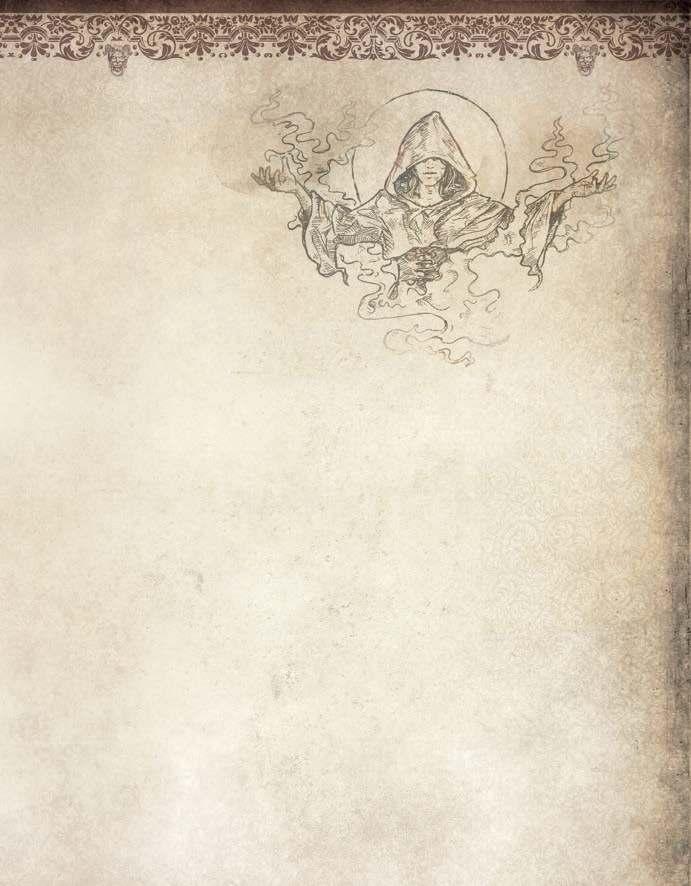


If you have spare moments during the day phase, you can read the text on the in-play character tokens to yourself. This will help you learn exactly how each character works and how they interact with the other characters in play. This is surprisingly useful when running a new edition for the first time. Some character text is subtle, and you may not notice everything on first reading. You usually only need to know how the in-play characters work. All other characters on the character sheet have little or no bearing on the game.
End the day and begin the night phase when you are ready. After the execution has occurred, the only thing that you usually need to do before calling for eyes closed is to set up the Grimoire for the night phase. Take a moment to make sure that you have the reminder tokens in the right place, and that the night tokens are accurate. This will make the night phase shorter for the players.
Characters such as the Slayer, Gossip, Artist, Savant, and Juggler have abilities that are used “during the day”. While it is best to encourage these players to use their ability before the execution occurs, some players may ask if they can use their ability after the execution has occurred but before the night phase begins. You decide whether to allow this or not. You may begin the night immediately after the execution, and if a player asks to use their day ability after you have called for eyes closed, then it is too late.
BLOOD ON THE CLOCKTOWER 29
G R E A T S T O R Y T E L L I N G
MAKING THINGS FUN
YOU CAN ASK, “HOW WOULD YOU LIKE TO DIE?” to a player just before they are executed. Doing this in public allows the dying player to come up with all sorts of interesting and amusing ways that they would like to be executed. Some players will want to take a long walk off a cliff, while many will request death by more pleasurable means.
If you like, you can narrate the details of their death in response. If you do so, it is best to keep things short, funny, and lighthearted. Don’t make it awkward. For example, if a player answers, “I die by getting stabbed in the back, at a banquet in my honor.” you can narrate this death by saying something like “Well... the townsfolk all gather together and hold a big feast, and while you’re giving a speech, somebody stabs you in the back with a cake fork, but you had already died of boredom from the speeches earlier in the night.” If you instead respond with a detailed description of which bones and muscles tear and how painful it is, this will simply gross people out and make them less likely to keep playing your games in the future.
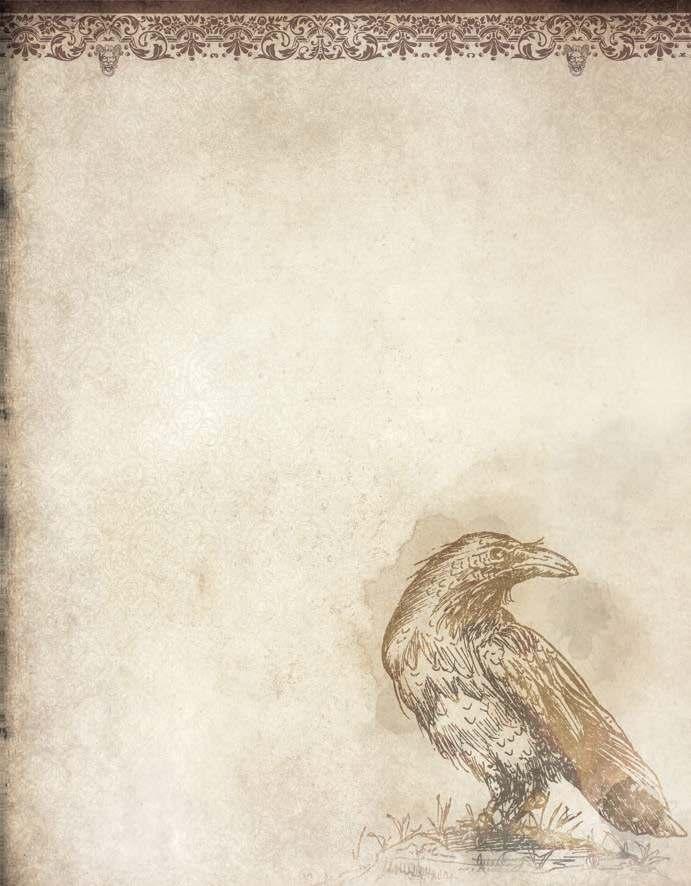


Keep the vibe fun and frivolous if you can. Say nothing at all if you can’t. Remember that people may have all sorts of things they are squeamish talking about in public, particularly anything sexual or too personal. This kind of witty banter with the group requires a good feeling for what is and is not appropriate for your group.
You can narrate as much or as little of the game as you wish. When the game begins, setting the scene with a little flair, such as “It was a dark and stormy night…” can add suspense and tone to your game. Also, giving context and story to a player’s death at night, or adding little verbal touches to the gathering of the townsfolk during the day can set your game up as something special. This requires some skill with words as well as creativity and an ability to think on your feet. Thankfully, it is entirely unnecessary. If you are uncomfortable, then skip this. A mostly silent Storyteller can still create perfectly functional and exciting games. The players themselves will create most of their own fun. Don’t break the rules. Even if it seems like it might be exciting to do so. Don’t simply decide that players should die instead of remain alive, or put in more or fewer Minions or Outsiders. The good players are relying on all the information available to win. If they base their logic on incorrect information, but they have no way of knowing that their information is incorrect, then they are simply guessing, and it will not be fun for them. Even if you think it might be wacky to secretly not put a Demon in play, to add a Drunk out of the blue, or to alter some other important rule, the players will probably not appreciate this, as they will feel like a victory was not fairly won or a loss was unfairly thrust upon them.

There are over two hundred characters in the complete BLOOD ON THE CLOCKTOWER collection, and one of them will do that crazy thing you want to do, in a way that is fun and fair.
Let players make their own decisions. During the night, players will sometimes seem to make odd choices. The Fortune Teller may choose the same players each night.
A Monk may protect a dead player. The Demon may attack a revealed Ravenkeeper. The Poisoner may poison the Demon. You never know what the player in question might be thinking, and it is best to not nudge them toward choosing what you think is best. In the above examples, the Fortune Teller may be testing to see if they are drunk, the Monk may want a death tonight so that three players remain alive for a Mayor victory, the Demon may want to get the Ravenkeeper out of the way early, and the Poisoner may be about to bluff as the Soldier and use the fact that no death occurred as evidence. If you let the players make their own choices, they may not be the best choices, but they own them.
Dealing with negative behavior is something you may have to do sooner or later. As is the case with all social gatherings, sometimes a player will speak in a disrespectful tone to another player. BLOOD ON THE CLOCKTOWER is a social game, which means social tools are useful in playing it. There are good, fun ones like charm or humor, but one or two players may get a little caught up in the excitement and revert to some of the more negative social tools, such as shouting, bullying, or emotional blackmail. Any player behavior that is unpleasant or otherwise destructive to the good vibe of the game should be nipped in the bud. This type of behavior is not acceptable, as other players may feel uncomfortable at best or argumentative and victimized at worst. Every player deserves to be in an environment where they feel accepted, respected, and able to make their own decisions.
BLOOD ON THE CLOCKTOWER 30 G R E A T
S T O R Y T E L L I N G
If you encounter negative behavior, take the player aside for a private chat. Explain to them that their tone and behavior might be unpleasant to one or more players. Stress that the problem is not the person, but the behavior. Most players will immediately change how they interact with others, as they hadn’t realized how heated they were getting. They probably saw their actions as enthusiastic or intense, and will appreciate that you took them aside to let them know otherwise.
Players that verbally justify their own bullying or aggression and put the blame on others should not be welcome at any future games you run until they can overcome this tendency. Similarly, players that feign offense and hurt feelings might be using negative social tools. For example, if a player pretends to be really annoyed, hurt, or angry at being nominated for execution, that can cause a bad vibe for the game. An upbeat, fun, and respectful mood is more important than either team winning or losing. Period.
More importantly, you need to know whether any in-game expression of distress is genuine, so that you can act appropriately and compassionately. If a player abuses that trust by pretending to be genuinely upset when they are not, you should have a quiet word with them to encourage them not to do so again.
Judging what is and isn’t offensive or unpleasant can be tricky, so use your best judgment. Censoring certain topics of conversation rarely goes well, as it is usually a player’s tone, not their words, that is problematic to others. Swearing, smacktalking, or vulgar or contentious subjects might be fine depending on your group. Personal attacks, insults, or anything that makes a player feel unsafe, hurt, or unheard are not.
Taboo subjects or subjects perceived as taboo—such as death, sexuality, gender, and the occult—may be a barrier for some people to play. Similarly, particular characters may offend some people or make others uncomfortable with playing. Whilst those uncomfortable with games involving taboo subjects in general may be better off finding a different game to play, you can cater to players with strong dislikes for particular characters by making your own character lists, with exactly the characters you want in play and none that you don’t. For more on this, read THE SCRIPT TOOL (page 36).
Shy players, paradoxically, tend to very much enjoy the intense social interaction of CLOCKTOWER. Many will stay silent and simply listen, taking part every so often by revealing information and putting their vote to good use. However, they may let other players interrupt them when trying to talk, or their voice may simply not be loud and dominant enough to get the group’s attention.
If you notice a player in this situation, give them the floor every so often. Silence the rest of the group and allow the shy player to say what they wish to say uninterrupted. Never demand that the shy player speak—simply ask if they wish to.
The best time to do this is when the shy player has been nominated, as this is when the group’s attention is mostly on them anyway. Even saying “You have been nominated. What do you have to say?” can be the prompt they need to talk and be listened to, without you needing to silence the rest of the group at all.
Gradually, over several games, you will probably find that the previously shy player will gain a sense of confidence and begin to participate more.
Don’t silence a talkative player unless the rest of the group is silenced too. Telling a talkative player to be quiet while letting everyone else speak will lead that player to feel they are being treated unfairly, which they have been.
CLOCKTOWER is a game about talking, after all. If you need to silence a notorious chatterbox so that you can be heard, or so a shy player can be heard, then silence the rest of the group as well.

Get the game to last until the final day if you can. Games of CLOCKTOWER are at their most exciting when there are just three or four players alive and a right or wrong execution can mean victory or defeat. Games that end at this point tend to have more tension, more drama, and a bigger cheer for the victorious team. So… how do you help the game get to the final day?
Help the weaker team as much as possible. As the Storyteller, you are not exempt from the rules, but there are many places where you can decide to give the weaker team an invisible stroke of luck.
Is evil absolutely stomping good?
You can give the drunk Empath correct information some nights, or make the Spy that is executed register as the Spy to the Undertaker. Maybe when the Mayor is attacked at night, you could kill a Minion instead of a Townsfolk?

Is good totally demolishing evil? Think carefully about what information you give to drunk or poisoned Townsfolk.


The wrong information at the right time can swing the fate of a game dramatically.
If you don’t know which team to help, help neither team or help the evil team. They will often need it without you realizing it. To win, the good team only needs to get lucky once, but the evil team needs to get lucky every day.
It is never a good idea to flat-out decide the winning team by exploiting a rule. It’s pretty unfair to end the game by killing the Tinker or by having an attacked Mayor kill the last evil player alive, for instance. However, a player that has been told to be mad by the Cerenovus can end the game by being executed, because that’s a player’s choice much more than your choice. Do what will create the most interesting game and the most climactic finish that the players feel they earned themselves.
R E A T S T O R Y T E L L I N G
BLOOD ON THE CLOCKTOWER 31
G
Listen to the bluffs of the evil players and run your game accordingly. If the Imp is claiming to be the Slayer and wants to “use their Slayer ability”, make sure it looks like that ability just didn’t work. Put in the same effort as if they were actually the Slayer! If the Spy is claiming to be the Fortune Teller, and is chosen by the Ravenkeeper, then choose the Fortune Teller to be the good character that the Spy registers as.
Evil players rely on you every so often to help make their lies sound like the truth. Help them out wherever you can.
For example, if an evil player is claiming to be the Virgin and is nominated, nothing will happen. To make it look like the evil player was actually the Virgin, you can move your hands around the Grimoire to make it look like you are putting the Virgin’s NO ABILITY reminder token by the character token. After all, if the real Virgin was nominated, this is what you would be doing.




Allow creative and unexpected strategies. CLOCKTOWER is a game that can be extremely fun when a player goes beyond what is normally accepted in a social deduction game. Maybe your evil players start texting each other during the game? That’s fine. Maybe good players keep lying through their teeth about who is who, in order to put evil off the scent? That’s great! Maybe players come back from talking to you in private, and tell the group something different from what you said to them? Super!
The more creative your players get, the better.
The exceptions to this rule are obvious. Bullying and shaming are never acceptable, and the rules of the game must be followed. Also, deals that involve factors outside of the game should always be discouraged. A player offering real money for votes, or promising some service after the game ends, is not fun. Keep the vibe friendly and you’ll have no problems. Basically, if the behavior is unorthodox and creative and makes the game more interesting, allow it. If the behavior will make the game worse, disallow it.
Waking the Demon and the Minions together at the start of the game can be fun. The evil players get to learn who they all are, make eye contact, and share a moment of devilish camaraderie. Instead of waking the Minions and pointing to the Demon, then waking the Demon and pointing to the Minions, just wake everyone together. You will still need to show the THIS IS THE DEMON and THESE ARE YOUR MINIONS info tokens, so that the players know who the Demon is. You will also need to put the Minions back to sleep before showing the Demon the three not-in-play character tokens as bluffs. So yeah—it is a little tricky. The Minions and Demon are normally woken separately to allow for characters such as the Lunatic, Poppy Grower, Snitch, Mole, and Magician to function, and to ensure that the Minions do not see the Demon’s character bluffs. If the character sheet does not include such characters, you can experiment with which method works best for you.
Your goal is to create a fun and engaging game. Just because you can do something doesn’t mean you should. Are you messing with the players in the service of fun, or indulging yourself at their expense? Just because you can make the Recluse register as the Demon when the Imp kills themself during the night, that doesn’t mean it will be fun or balanced. Just because you can convince a confused good player that they are evil, that doesn’t mean the player will have a good time when they find out the truth. You can give completely useless information to the Savant, but interesting and unique information is better.
To encourage a big and exultant celebration at the end of the game, declare the victory with some flair. Simply saying “evil wins” in a quiet voice out of the blue doesn’t really encourage the evil team to jump up and start high-fiving each other. Giving the announcement some dramatic pause, getting the group’s attention before speaking in an authoritative voice, or telling the players that high-fives and hugs are acceptable can all be great ways to allow the winning team to celebrate in the way they’d like. It’s their victory. They’ve earned it. And once you have experienced the thrill of winning as the Demon in a 15+ player game, you’ll know how cathartic it can be to cut loose in celebration at this point. Even an unexpected loss after a game this size will be remembered for months to come.
Each game, as the Storyteller, you will have a lot of interesting decisions to make. Each decision should be made for the good of the game and for the fun of the group. This will usually mean that you are creating as much confusion as possible and leading the good team astray, because that makes a fun game for all. But please keep the fairness of the game as a whole in mind— you are there for the players’ enjoyment.
G R E A T S T O R BLOOD ON THE CLOCKTOWER 32


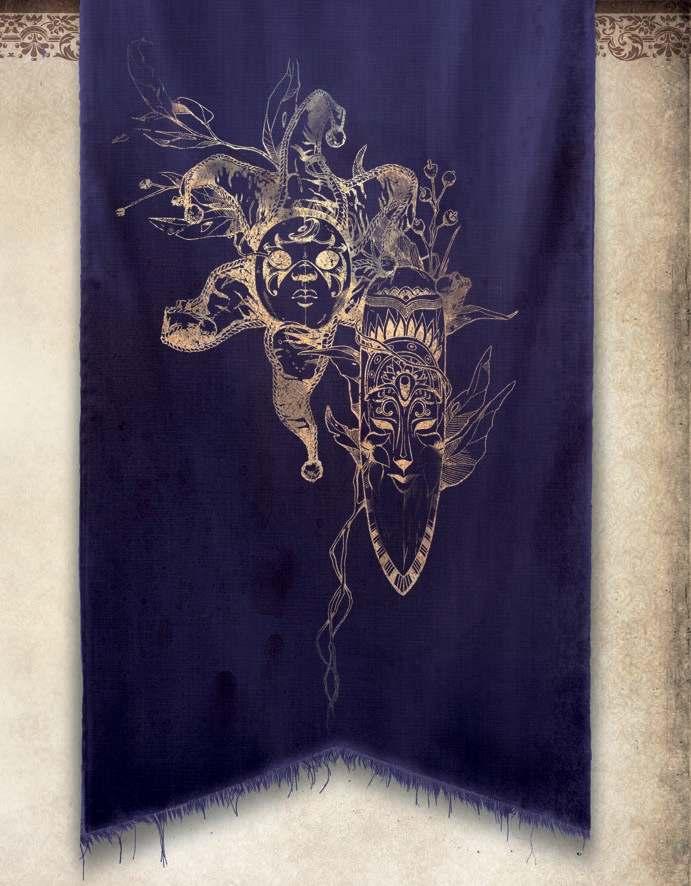
BLOOD ON THE CLOCKTOWER 33 G R E A T S T O R Y T E L L I N G

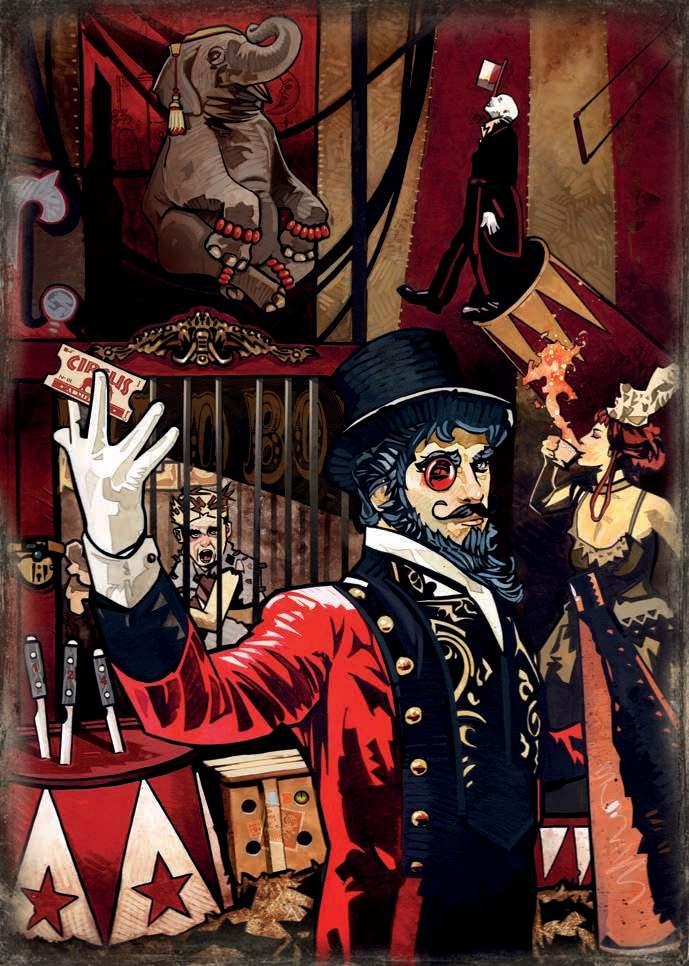
ARE YOU READY TO GO FURTHER?
This is the final chapter of your personal storytelling saga. It’s also the longest one, because it will involve you striking out on your own and having a lifetime of unique games and experiences, many beyond the scope of this rulebook.


You’ve executed a Spy who nominated the Virgin, you’ve seen a Slayer accidentally kill a Recluse, you’ve witnessed a dead Fang Gu lie about being the Snake Charmer, and you’ve watched a Lunatic spend an entire game convinced that they’re the Shabaloth. At this point, you’re pretty sure you’ve seen it all. But that doesn’t mean there are no more frontiers left to conquer. A world of new experiences awaits—all you need to access them is an internet connection and a generous helping of imagination.
Learning the rules and running the scripts provided should be more than enough for varied and exciting games for years to come, but just like all great narratively-driven experiences, using the pre-written material is how you learn and creating your own is how you thrive.
The following chapter is dedicated to how you, as the owner of this game, can craft fresh and exciting experiences for both yourself and your friends. In it, we’ll talk you through the skills and tools required to build your own scripts, combining characters from various editions and beyond, to breathe new life into them. We’ll discuss alternate ways to play the game for smaller groups, as well as how to grow your posse of players to get those epic, twenty player maelstroms under your belt. We’ll give you a brief overview of each official script, a preview of what’s to come in the future, and we’ll talk about handing the mantle of Storyteller over to your friends so you can experience the game from a whole new perspective.
THE SCRIPT TOOL
NCE YOU ARE FAMILIAR WITH THE CHARACTERS from the three editions in the core set, you may want to create your own unique character lists. These are called scripts


Do you have favorite characters that you like to put in nearly every game? Have you thought of character combinations that would make for interesting and challenging situations?
Do you want to make a game with a Pit-Hag, a Saint, an Evil Twin, and an Innkeeper? Maybe you want to combine the Klutz and the Spy? If you have internet access, you can do so!
At bloodontheclocktower.com/script, you can create a script from any combination of characters you own. This tool will also generate a night sheet for a game with your custom character list, making it easy to run.


Comparing scripts is a fun and challenging way to improve your designs. It is often a good idea to start with just a few core characters that you want to include, and build from there. Online at bloodontheclocktower.com, or on your local FACEBOOK or MEETUP group, there should be a community active in comparing their creations. You are welcome to join.
Adding Travellers to a custom game is easy. Just do so normally. Some Travellers may not be appropriate to mix with the characters in play, some will be. You can decide on five Travellers that merge well with your script before the game begins, or make a decision in the moment.
Some Fabled characters are designed to help you create unique and interesting games. Creating your own script is an art, and it may take a few tries to find something you are happy with. Luckily, you already have some Fabled characters to help you make your game run smoothly. Maybe you have an overabundance of evil in the game? Or only a dozen characters?
Fabled characters can also ensure your game has an unknown number of Outsiders (which allows players to safely bluff as them), or add extra misinformation when needed, or resolve situations where character abilities clash.
See the TRAVELLERS & FABLED almanac for more information on using Fabled characters to make your game more balanced and fun for all players.
Handling strange character interactions is more art than science. When you create your own scripts, you’ll end up with some odd situations indeed. Maybe you’ll have an evil Saint? Or end up with two Philosophers wanting to turn into the same character at the same time? With over two hundred characters in the works, some weird situations will arise. While the CLOCKTOWER rules are written with this in mind, you might be uncertain sometimes about how two characters combine. Use your best guess. As the Storyteller, your decision is final—but make sure you tell the players that you’re making a ruling. It might not be the best call, but at least it will be a clear one.
TEENSYVILLE
IF YOUR GROUP HAS FIVE OR SIX PLAYERS, you can play practically endless variations of CLOCKTOWER by playing Teensyville games. The village of Teensyville lies just a few days’ walk from Ravenswood Bluff, and is perfect for player counts that are smaller than normal.
Each Teensyville script contains a different collection of characters. You can use the Script Tool to create them. All Teensyville scripts cater to five or six players by including only a few possible characters on the character sheet: six Townsfolk, two Outsiders, two Minions, and one Demon.
New players will have an easier time knowing which characters are in play because there are fewer to learn. Veteran players will be able to strategize more because Teensyville games can include characters from any edition.
Creating Teensyville scripts is a great way for you to take your Storytelling skills to the next level. Getting creative and discovering which characters combine in interesting ways allows you and your group to spice things up, especially after playing your billionth game of five-player TROUBLE BREWING
If you want to run Teensyville games but would prefer to use premade Teensyville character sheets, some of our favorite Teensyville scripts can be downloaded from bloodontheclocktower.com/ teensyville. Each printout comes with its own night sheet for that script, ensuring your Teensyville games will run smoothly.
BLOOD ON THE CLOCKTOWER 36
G O I N G F U
O
R T H E R
GROWING YOUR GROUP
THE MORE, THE MERRIER. The larger your CLOCKTOWER group, the more fun everyone will have, and the more varied opponents and allies that everyone will get to play with. Search for local groups on social media if you need more players for your games or want to participate in games that others run. Some places have established BLOOD ON THE CLOCKTOWER groups, or groups for social deduction games generally, on FACEBOOK or MEETUP.COM. These meeting places are a great way to get to know more players in your area. If there aren’t yet any groups near you, feel free to start one! If FACEBOOK is the devil, there are plenty of similar live event sites that may prove to be a useful way to connect with players. Check bloodontheclocktower.com/play and we may be able to point you towards a few great groups that we know about around the world.

Encourage your players to storytell. Once you have mastered the basics of the Storyteller role, it’s time to get into the game and dominate with your superior knowledge! If you encourage players to take on the Storyteller role, they too can see how rewarding it is, and will want to invite their friends too. Players are usually pretty keen to get online and start designing scripts, so they’ll need the basic skills to run the games they design. They can learn by reading this rulebook or by watching and helping you storytell for a game or two, then having you watch and help them storytell for a game or two.
Be a leader. The Storyteller role usually has an element of authority. It is also usually the Storyteller that organizes game times and locations. Generally speaking, the players will look to you for times and dates and a little social leadership. Treat them well. Listen to what they want. Tailor games to their interests and playstyles. Above all, be welcoming and helpful to the new players in your group. Taking care of just the veterans means that your group will not grow. If you take care of the new players—explain the rules to them, help them out when they have questions, and keep a friendly and positive vibe—then new players will bring new players, and your group will continue to grow.
Encourage veterans to be good to the new players. Many enthusiastic veteran players tend to over-explain things to new players. Too many unimportant game rules, too many character exceptions, and too many pieces of strategy advice all tend to confuse, not enlighten. Everything a new player needs to know to start playing is explained on the rules sheet. They can pick the rest up as they go.
If your veterans keep things simple and help out the new players, the new players will stay. This benefits the veterans too, as they may make helpful in-game allies to secure a victory. Many a game has been won or lost by a helpful veteran talking to the new players and getting them involved, for good or evil.
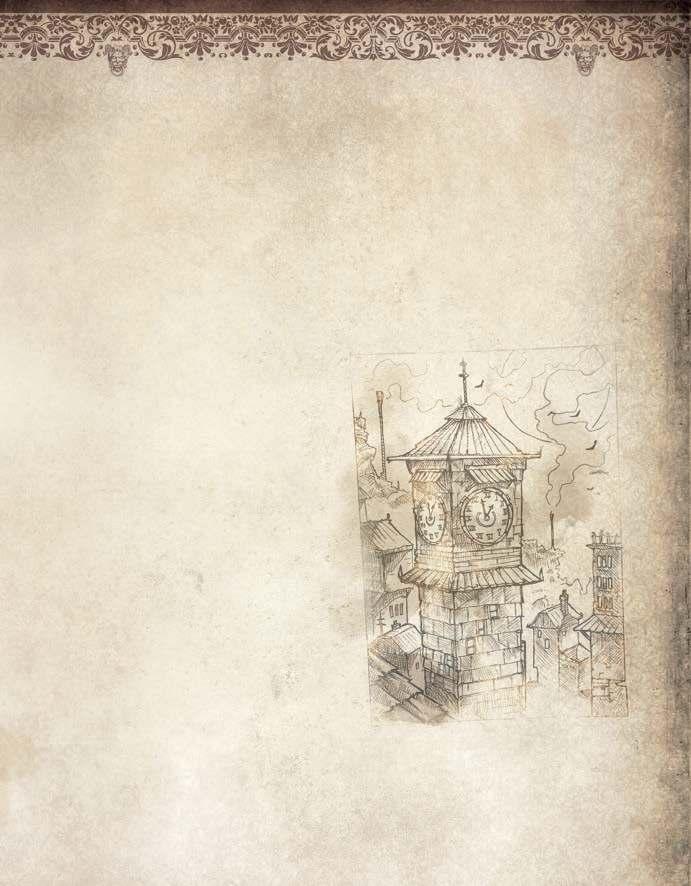


For new players, keep it simple. Do not overload them with information. Instead, give them just enough to get involved and have a good time. Whilst most players will pick up the basics sometime during their first game, it is usually counterproductive to tell a new player all the rules and major strategies at once—this can totally overwhelm them.
The rules sheet is designed to get new players into playing the game with a minimum of fuss. All the extra rules—drunkenness, madness, strange character interactions—they can learn as they play. Your veterans will probably be more than happy to explain how these things work on your behalf. Veterans can be great for helping new players get into the game, but only if they take things at the right pace. Encourage them to engage the new players, particularly if they are dead. After all… they are probably on the same team.
Some new players will drastically underestimate or misunderstand how a character works, and ask you for strategy advice. Sometimes, you’ll notice that a new player looks completely confused but isn’t asking for help.
Feel free to have a private chat with them and give them a helping hand. It is never a good idea to give them one single piece of strategy advice, as this implies that this is the only way to play a particular character—you don’t want a player to ever feel that they “should” act a certain way or employ a particular strategy. Either give them a few pieces of strategy advice, from which they can choose, or let them figure out their own strategy in their own way, even though they may need a nudge in the right direction.
BLOOD ON THE CLOCKTOWER 37
G O I
N G F U R T H E R
N G F U R T H E R
For example, the Ravenkeeper and the Virgin are two characters that most beginner players think are weak. The Ravenkeeper gets the best information of any character in TROUBLE BREWING, but has to trick the Demon into attacking them first. The Virgin, when nominated by a Townsfolk, confirms that two players are good… which is fantastic information, albeit at the price of a death. Instead of saying to a Ravenkeeper or a Virgin player “you should do X” or “you should say Y,” let them know exactly why and how their character is powerful, and they will often figure out their own strategy from that point onwards.
Give strategy advice to new players only if they really need it. New players have to quickly learn a lot of information—how to win, how executions work, how their character works, what other characters are in the game.
What they do not need is someone telling them (even if they ask for it!) that they “should do this” or “should not do that.” If players feel that they should do or not do something, then they are not making an independent choice about how to play the game.
CLOCKTOWER has many interesting strategies that will emerge through play, and new players will figure out what to do as they become familiar with the basic rules. If you absolutely must give advice to a new player about what to do, keep it simple, such as telling good players to “reveal their character, either to the group, or to someone that they trust, and listen to what others are saying,” and stick to telling evil players to “pick a good character to pretend to be,” and to make sure they know how that character works, in case people ask them questions.
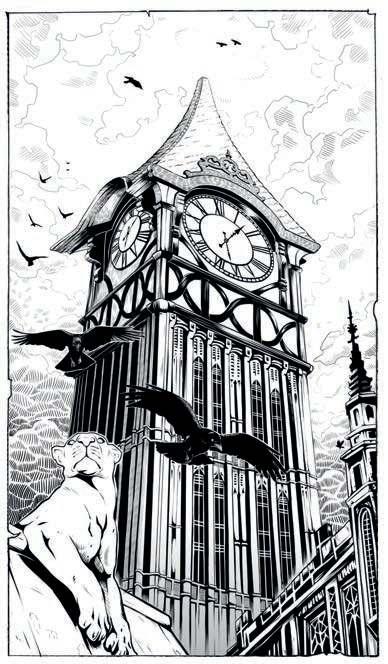

To grow, what most new players really need isn’t great strategy advice. They need to know that it is okay if they die. They need to know that they are free to say whatever they want to whoever they want, in public or in private. They need to feel like they are a valuable part of the team. If these bases are covered, they will enjoy your game and come back for more.
Use Travellers. Whenever possible, encourage late players to join the game as Travellers. Many players will simply want to watch a game in progress, feeling that joining the game late is a bit of a faux pas. Nothing could be further from the truth! Travellers are some of the most powerful, flexible, and downright fun characters in the game, and their arrival balances out a game in progress. Most players will want Travellers to join their game, as most Travellers are good! Keeping this “join at any time” vibe happening will make your games more accessible to everyone. Use the Fabled. These characters are designed so you can include all types of players and encourage their participation. The Angel helps new players enjoy their first game without fear of death. The Revolutionary helps players join in when they would otherwise be incapable. The Buddhist gets your veterans to be silent while the new players contribute. If you know your Fabled, your game will get a reputation as being super inclusive, and that’s a good thing.
Check out the strategy guide online. For in-depth strategy on each character go to the wiki, a compendium of ideas, tips, and advice that’s been collated over years of play and thousands of games. You may discover an original or bizarre way to play a particular character that your group hasn’t tried yet. Find it all at bloodontheclocktower.com/wiki
To include blind players, or players with vision impairment, there are some resources and links at bloodontheclocktower. com/accessibility that may be able to help. While the Revolutionary character can be useful, having braille character sheets or alternate game processes can make things even easier, depending on the player’s needs and abilities.


BLOOD ON THE CLOCKTOWER 38 G O
I


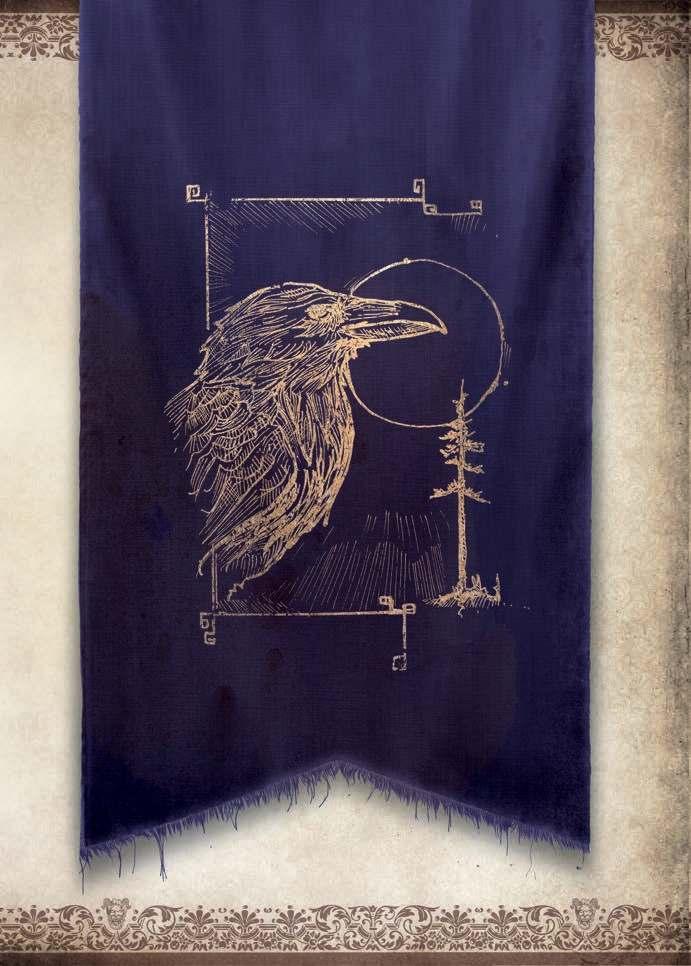

BLOOD ON THE CLOCKTOWER 39 G O I N G F U R T H E R
R T H E R

THE EDITIONS
YOUR BLOOD ON THE CLOCKTOWER BOX SET comes with three editions for you to try: TROUBLE BREWING, BAD MOON RISING, and SECTS & VIOLETS. We highly recommend that you get familiar with Storytelling TROUBLE BREWING before moving on to these more complex editions. The character almanac for TROUBLE BREWING offers many helpful reminders of game concepts that make it a useful reference as you play, while the more complicated editions only give reminders for newly introduced concepts and particularly intricate interactions.
More editions will be available soon. Each edition has 25 new and unique characters tailored to create a unique gaming experience, and the strategies needed for victory vary drastically with each. Some editions encourage whispers and secrets, others open sharing. Some encourage pure logic, others wild and crazy bluffing. If you would like to take your CLOCKTOWER games to the next level, visit our site for more information: bloodontheclocktower.com
All characters included in these editions are also listed in the Script Tool, so you can mix and match them with other characters you own, creating your own games!
INTERMEDIATE
BAD MOON RISING is a death extravaganza. Demons kill multiple times per night and Minions get in on the action too. Good players can take great risks to gain reliable information, but may accidentally kill their friends in the process. Luckily, there are many ways to keep players alive long past their use-by date. If the good team cannot determine which Minions and Demons are in play, however, their doom is all but certain.

Recommended for players who are proactive, dedicated to working as a team, and don’t fear dying.
BEGINNER
TROUBLE BREWING has a little bit of everything. Some characters passively receive information, some need to take action to learn who is who, while some simply want to bait the Demon into attacking them. Both good and evil can gain the upper hand by making well-timed sacrifices. TROUBLE BREWING is a relatively straightforward Demon hunt, but evil has a number of dastardly misinformation tricks up their sleeves, so the good players had better question what they think they know if they hope to survive.

Recommended for players and Storytellers new to BLOOD ON THE CLOCKTOWER or to social deception games.


INTERMEDIATE

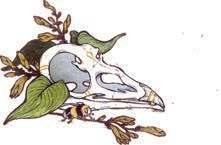
SECTS & VIOLETS is the craziest of the three editions included in the base set. Good characters get amazing information each and every night. However, the evil team is extremely varied and threatening and can throw massive confusion into the mix. Characters change alignment. Players change characters. Even the evil team can lose track of who is who. This is also the first appearance of madness, which throws all manner of spanners into the works.
Recommended for players who want to do wild and unexpected things, pushing the limits of what can be achieved in a bluffing game.

BLOOD ON THE CLOCKTOWER 40
G O I N G F U
INTERMEDIATE
GARDEN OF SIN is a catastrophe of pure logic. Every single good character gains some information, even the Outsiders. The Demons do not attack during the night, but win automatically after a set number of days. The leisurely pace gives plenty of time to put all the pieces of the puzzle together, but strange logical conditions and counterintuitive information reversals mean that the good team will have to use their combined brain power—or perish.



Recommended for cool heads, puzzle solvers, and Storytellers that like to get creative.
EXPERT
MIDNIGHT IN THE HOUSE OF THE DAMNED is not for the faint of heart. Many characters flat-out break major rules or even make their own. Many booby traps await the careless Townsfolk or the ambitious Minion. Many characters can win or lose the game single-handedly, so crafty and adventurous bluffs can yield massive rewards. However, just figuring out who exactly is on your team can be a challenge in itself. All hope abandon, ye who enter here.

Recommended for those comfortable with risk, challenge, and extremely ambitious bluffing.
INTERMEDIATE

THE TOMB is raw power. The Townsfolk here are some of the most powerful in existence… but they must use their abilities wisely, as information is sparse. Sacrifices of the good are necessary to determine who is who.





Recommended for loudmouths, rapscallions, ne’er-do-wells, and anyone who lusts for all the power and none of the responsibility.
BEGINNER THROUGH EXPERT
THE GREATEST SHOW ON EARTH is a collection of fiftyish extra characters for you to add to any BLOOD ON THE CLOCKTOWER games that you design yourself using the Script Tool. Unlike the other editions, this one doesn’t include a suggested character list. Many characters too wild and unusual to be included in the other editions have found their way into this collection.
Recommended for players who want some extra spice, or Storytellers who want to create some extremely bizarre and uniquely challenging situations for their players.
BLOOD ON THE CLOCKTOWER 41 G O I
G
N
F U R T H E R
GLOSSARY
ABILITY: The special power or penalty of a character, printed on its character token, the character sheet for the chosen edition, and the character almanac for the chosen edition. The definitive text of the ability is printed on the character sheet, and the character almanac is used for guidance. Characters have no ability when dead, drunk, or poisoned.
ABOUT TO DIE: The player who has enough votes to be executed and more votes than any other player today.
ALIGNMENT: The team that a player is currently on. Alignment is either good or evil. If a player changes alignment, their character stays the same. If a player changes character, their alignment stays the same. Players know their own alignment.
ALIVE: A player that has not died. Alive players have their ability, may vote as many times as they wish, and may nominate players. As long as three or more players are alive, the game continues.
ALIVE NEIGHBORS: The two alive players that are sitting closest—one clockwise, one counterclockwise—to the player in question, not including any dead players sitting between them.
ALLY: A player of the same alignment.
CHARACTER: The role that a player plays, such as the Butler, as listed on the character sheet and character almanac for the chosen edition. Characters may be in play or not in play.
CHARACTER SHEET: The laminated paper sheets that list all of the possible characters and their abilities for the chosen edition.
CHARACTER TOKEN: The large round token that each player gets at the start of the game that indicates their character. Players cannot look at each other’s character tokens.
CHOOSE: This word in a character’s ability indicates that their player decides something. If this word is absent, the Storyteller decides instead.
CLOCKTOWER: BLOOD ON THE CLOCKTOWER, the world’s greatest bluffing game!
DAWN: The end of a night, just before the next day begins. Characters that act “at dawn” act after almost all other characters.
DAY: The game phase in which players have their eyes open, talk with each other, and vote for an execution. Each day is followed by a night. Each night is followed by a day.
DEAD: A player that is not alive. Dead players may only vote once more during the game. When a player dies, their life token flips over and they gain a vote token, they gain a shroud in the Grimoire, they immediately lose their ability, and any persistent effects of their ability immediately end.



DECLARE: State to the group so that everyone can hear you.
DEMON: A type of character that begins evil. If the Demon dies, the good team wins. Demons usually kill players at night and have some other ability that harms the good team.
DEMON INFO: Shorthand on the night sheet representing the information that the Demon receives on the first night, if there are seven or more players. The Demon learns which players are the Minions, and learns three good characters that are not in play to help them bluff.
DEMON, THE: The player that has the Demon character. In a game with multiple Demons, each alive Demon player counts as “the Demon.”
DRUNK: A drunk player has no ability but thinks they do, and the Storyteller acts like they do. If their ability would give them information, the Storyteller may give them false information. Drunk players do not know they are drunk.
DUSK: The start of a night, just after the players close their eyes. Characters that act “at dusk” act before almost all other characters. Abilities that last “until dusk” end as soon as the players go to sleep.
EACH NIGHT: Every night phase.
EACH NIGHT * : Shorthand on character sheets and tokens meaning “Every night phase except for the first night phase.”
EDITION: A scenario of CLOCKTOWER that contains a set of tokens, character sheets, and a character almanac. For example, TROUBLE BREWING. Each edition has a unifying theme, strategy, and tone.
EVIL: The evil alignment. Minions and Demons (red characters) start as evil. Evil wins when just two players are alive, not including Travellers.
EVIL CHARACTER: Minions and Demons.
EXECUTION: The group decision to kill a player other than a Traveller during the day. There is a maximum of one execution per day, but there may be none. A nominated player is executed if they got votes equal to at least half the number of alive players, and more votes than any other nominated player.
EXILE: The group decision to kill a Traveller during the day. There may be any number of exiles per day, including none. Any players may support an exile, even dead players without a vote token. Abilities cannot affect an exile decision in any way. Though an exile is similar to a vote for execution, the process is not a vote, and an exile is not an execution.
(See Vote and Execution.)
FABLED: A type of character for the Storyteller. Fabled characters are neutral, chosen by the Storyteller publicly, and usually make the game fairer in strange situations.
FALSE INFO: False information, such as a false statement, gesture, or character token. The Storyteller may give false information when a character registers as a different character or alignment, or when a player is drunk or poisoned. (See True info.)
BLOOD ON THE CLOCKTOWER 42 G L O S S A R Y
FIRST NIGHT: The night phase that begins the game. Some characters act only during the first night. Some characters act during each night except the first. Players may talk about their characters only after the first night.
GOOD: The good alignment. Townsfolk and Outsiders (blue characters) start as good. Good wins if the Demon dies.
GOOD CHARACTER: Townsfolk and Outsiders.
GRIMOIRE: The box that stores the CLOCKTOWER pieces, held and updated by the Storyteller. Players cannot look in the Grimoire. The Grimoire shows the actual states of all the characters, such as who is alive or dead, who is poisoned, who is acting at night, and so on.




HEALTHY: Not poisoned.
INFO: Information.
INFO TOKEN: Rectangular tokens that give information and are sometimes shown to players at night. For example, the THIS IS THE DEMON info token.
IN PLAY: A character that exists in the current game, either alive or dead.
LEAF: The small colored symbols on many character tokens that help the Storyteller run the game. Green leaves on the top show the number of reminder tokens to add to the Grimoire. A green leaf on the left shows that the character needs a night token on the first night. A green leaf on the right shows that the character needs a night token on all other nights. An orange flower means that the character setup is different than normal for this game.
LIFE TOKEN: These tokens are placed on the Town Square, corresponding to the players’ seating positions, and show which players are alive or dead. The light side shows that the player is alive, and the dark side shows that the player is dead.
LOSE: At the end of the game, one team will lose. If a team loses, all players of that alignment lose, whether alive or dead. Evil loses when the Demon dies. Good loses when there are only two alive players, not including Travellers.
MAD: A player who is “mad” about something is trying to convince the group that something is true. Some players are instructed to be mad about something—if the Storyteller thinks that a player has not tried to convince the group of the thing they were instructed to be mad about, then a penalty may apply. Some players are instructed to not be mad about something—if the Storyteller thinks that a player has tried to convince the group of that thing, then a penalty may apply.
MIGHT: Shorthand on character sheets and tokens. Something that “might” happen means the Storyteller chooses whether it happens or not.
MINION: A type of character that begins evil. Minions have abilities that help the evil team. There are usually one to three Minions per game. The Traveller sheet lists the number of Minions in the current game.
MINION INFO: Shorthand on the night sheet representing the information that the Minions receive on the first night if there are seven or more players. The Minions learn which other players are Minions, and which player is the Demon.
NEIGHBORS: The two players sitting one seat clockwise and counterclockwise from the player in question. For example, “alive neighbors” are the closest alive players, one clockwise and one counterclockwise, and “Townsfolk neighbors” are the closest Townsfolk, one clockwise and one counterclockwise.
NIGHT: The game phase in which players close their eyes and certain characters wake to act or receive information. The game begins with the night phase. Each day is followed by a night. Each night is followed by a day.
NIGHT SHEET: The sheet the Storyteller uses to know which characters act in which order at night. The night sheet has one side to use on the first night and one side to use on all other nights.
NIGHT TOKEN: The tokens that the Storyteller puts next to the night sheet to indicate which characters may need to act tonight. Which night tokens are needed is indicated by the leaves on the left and right sides of each character token.
BLOOD ON THE CLOCKTOWER 43 G L
O S S A R Y
NOMINATION: The act of declaring a group vote to execute a player, which is acknowledged by the Storyteller. Each player may nominate once per day, and each player can be nominated once per day. Only alive players may nominate.
NOT IN PLAY: A character that does not exist in the current game but is on the character sheet.
ONCE PER GAME: An ability that can be used only once. If a player uses this ability, even while drunk or poisoned, they cannot use this ability again. If a player dies without using their once per game ability, they lose it.
OUTSIDER: A type of character that begins good. Outsiders have abilities that are unhelpful to the good team. The Traveller sheet lists how many Outsiders are in the current game.
PLAYER: Any person who has an in-play character, not including the Storyteller.
POISONED: A poisoned player has no ability but thinks they do, and the Storyteller acts like they do. If their ability would give them information, the Storyteller may give them false information. Poisoned players do not know they are poisoned. (See Drunk.)
PRIVATE: Anything whispered between two players, or between a player and the Storyteller, so that the other players do not hear it.
PUBLIC: Anything said or done in such a way that most players, as well as the Storyteller, know that it happened.
REGISTER: A player that “registers as” a specific character or alignment counts as that character or alignment for game rule purposes and for other players’ abilities. For example, if a good player “registers as evil” they are still good (and win when good wins), but they count as evil to characters that detect evil. Registering as a character does not impart that character’s ability.
REMINDER TOKEN: The small tokens that help the Storyteller remember all sorts of things. Reminder tokens are specific to a certain character.
RESURRECTED / REGURGITATED / REBORN / RAISED: A dead player becoming alive again. When this happens, the player gains their ability back, even if it was a “once per game” ability that had been used. If this ability functions on the first night only, it functions tonight.
RULES SHEET: The sheet that is read out at the beginning of a game so that new players can learn the important rules. New players may instead read the sheet privately if they wish.
SCRIPT: A collection of characters, created via the Script Tool, that can be printed to make character sheets.
SCRIPT TOOL: The online character list generator, which allows you to design scripts from any combination of character tokens you own. Use the Script Tool at bloodontheclocktower.com/ script
SETUP SHEET: The sheet that details what the Storyteller needs to do before beginning a game.
SHROUD: The black banner-shaped token used in the Grimoire to indicate that a player is dead.
SOBER: Not drunk.
START KNOWING: Shorthand on character sheets and tokens. A “start knowing” character gains knowledge on the first night or, if such a character is created mid-game, at that point instead.
STATE: A current property of a player. A player is always either drunk or sober, either poisoned or healthy, either alive or dead, either good or evil, and either mad or sane.
STORYTELLER: The person who runs the game. The Storyteller keeps the Grimoire, follows the rules of the game, and makes the final decision on what happens when a situation needs adjudication.
TEAM: All players sharing an alignment. “Your team” means “You and all other players that have the same alignment as you.”
THINK: A player who thinks they are a different character receives a character token that does not match their true character in the Grimoire. The Storyteller pretends to this player that they are this false character.
TOMORROW: The day phase and the night phase following the current night phase.
TOWNSFOLK: A type of good character. Townsfolk have abilities that help the good team. Usually, most in-play characters are Townsfolk. The Traveller sheet lists the number of Townsfolk in the current game.
TOWN SQUARE: The purple game board, placed in the center of the circle of seats. The Town Square has the players’ life tokens and vote tokens on it, and the Traveller sheet under it.
TRAVELLER: A type of character for players who are late to join or who expect to leave early. The player chooses their character, and the Storyteller chooses their alignment. Travellers have great power, but may be exiled by the group.
TRAVELLER SHEET: The sheet placed under the Town Square. It lists how many Townsfolk, Outsiders and Minions are in the current game and what the Travellers’ abilities are.

TRUE INFO: True information, such as a true statement, gesture, or character token. The Storyteller must always give true information about the rules. (See False info.)
TYPE: A class of character—Townsfolk, Outsider, Minion, Demon, Traveller, or Fabled.
VOTE: Raising a hand when the Storyteller is counting the number of players in favor of an execution. Players may vote as many times as they want per day. A dead player may only vote once for the rest of the game. The votes are tallied clockwise, ending with the nominated player. The exile process, though similar, is not a vote. (See Exile.)
VOTE TOKEN: The round token that is put on a player’s life token when they die. When this dead player votes, they remove their vote token and cannot vote for the rest of the game.
WAKE: A player opening their eyes at night. The Storyteller wakes a player by tapping twice on their knee or shoulder, and wakes all players by saying “eyes open, everybody” at dawn.
WIN: At the end of the game, one team will win. If a team wins, all players of that alignment win, whether alive or dead. Good wins when the Demon dies. Evil wins when there are only two alive players, not including Travellers.
BLOOD ON THE CLOCKTOWER 44 G L O S S A R Y







































































































